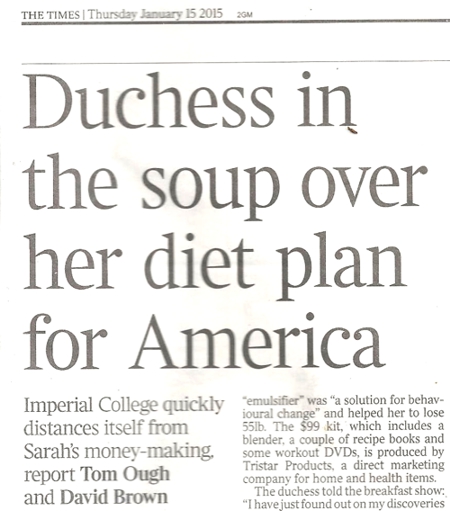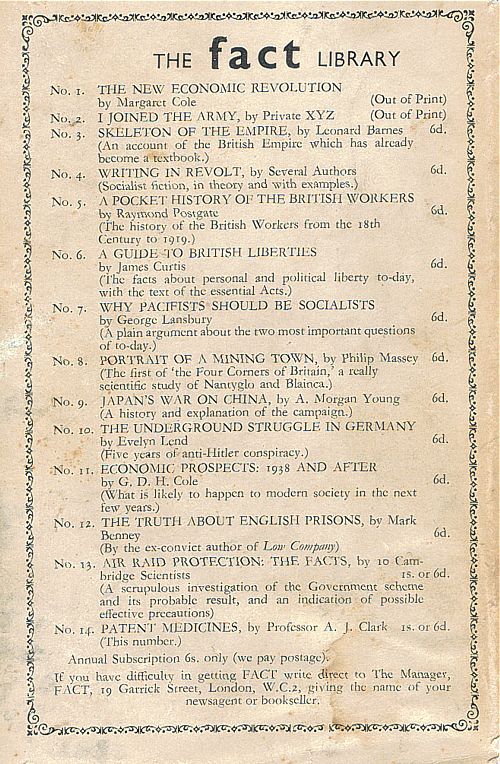advertisements
Sarah Ferguson, ex-wife of Prince Andrew, Duke of York, seems to need a lot of money. Some of her wheezes are listed in today’s Times. That’s behind a paywall, as is the version reproduced in The Australian (Murdoch connection presumably). You can read it (free) here, with more details below the article.
|
Thomas Ough and David Brown Published at 12:01AM, January 15 2015 In her seemingly endless quest to make money, Sarah, Duchess of York, has had little hesitation using her title to generate sales. This week, though, she landed herself in trouble after appearing to use the name of Britain’s foremost scientific university to lend credibility to a promotion for her new diet system. The duchess told NBC’s Today show during an interview to promote her “emulsifier” programme that she was aware of the dangers of obesity through her work as an ambassador for the Institute of Global Health Improvement at Imperial College London. Last night she apologised for “any misunderstanding” after Imperial College, ranked the joint second-best university in the world, sought to distance itself from the duchess’s promotion. A spokesman said: “The commercial activities promoted by Sarah Ferguson in the interview with Today are not connected in any way to Imperial’s staff or research activities, and the college does not endorse the suggestion of any possible link.” The institute, which has more than 160 specialists, including clinicians, engineers, scientists and psychologists, is headed by Lord Darzi of Denham, a former Labour health minister. The duchess told the Today presenter Matt Lauer that she had been a comfort eater since the age of 12 but the “turning point” was when she realised that she was the same weight as when pregnant with Princess Beatrice, now 25. “I couldn’t bear looking at myself any minute longer,” she confided. “In fact, the size of my ass probably saved my life.” She said she discovered that the “emulsifier” was “a solution for behavioural change” and helped her to lose 55lbs. The $99 kit, which includes a blender, a couple of recipe books and some workout DVDs, is produced by Tristar Products, a direct marketing company for home and health items. The duchess told the breakfast show: “I have just found out on my discoveries with Imperial College London . . . I’m an ambassador for the Institute for Global Health Innovation, and I found out that children, little children, are going to die before their parents because of obesity.” The benefits of the kit were questioned yesterday by Ayela Spiro, a senior scientist at the British Nutrition Foundation. She said: “In terms of the particular product, no juicer or blender on their own can enhance how much nutrition your body will absorb. Any claims made about such products such that it accelerates weight loss, boosts energy and strengthens the immune system need to be treated with caution.” Professor David Colquhoun of University College London, said: “I find it pretty amazing that Imperial chose someone like her to be an ‘ambassador’. Imperial does have an interest in appetite suppression but hasn’t come up with any usable product yet and this research has nothing to do with blenders. “[Her television appearance] was sheer name-dropping, something she’s quite good at. The only ‘discovery’ she seems to have made is that if you eat less you’ll lose weight. The $100 blender has nothing to do with it.” A spokesman for the duchess said: “She is not trying to use her association with the institute to promote her personal interests. She was talking about ‘behavioural change’, which is endorsed by the institute, and her own behavioural change.” |
With the article there’s an inset that gives details of other ways in which Sarah Ferguson has exploited her title to make money.

Fergie’s latest wheeze, Duchess Discoveries is being promoted heavily on US television. It bears a close resemblance to those ghastly daytime TV advertising channels. Watch her interview on a US TV programme, "Today".
It’s partly promoting her latest diet scam, and partly a vigorous defence of her ex-husbands innocence in the face of allegations of sexual shenanigans. Of course she doesn’t know whether the allegations are true. The Queen doesn’t know (so why bother with the denial from Buckingham Palace?). And I don’t know. We know plenty about Prince Andrew’s bad behaviour, but we don’t know whether he’s had sex with minors.
Worse still is the promotional video on the “Duchess Discoveries” site itself.
I quote:
“I’m SO excited about my fusion accelerator system, accelerates weight loss, accelerates your energy, accelerates and strengthens your immune system.”
"accelerates weight loss" is certainly unproven. Mere hype
"accelerates your energy" is totally meaningless. It’s the sort of sciencey-sounding words that are loved by all quacks.
"accelerates and strengthens your immune system". Sigh. "strengthening the immune system is the perpetual mantra of just about every quack. It’s totally meaningless. Just made-up nutribollocks.
The promotional video is fraudulent nonsense. If it were based in the UK I have no doubt that it would be quickly slapped down by the Advertising Standards Authority. But in the USA the first amendment allows people to lie freely about nutrition, which is why it’s such big business.
It bothers me that the most that the best that the British Nutrition Foundation could manage was to say that such claims "need to be treated with caution". They are mendacious nonsense. Why not just say so?
Follow-up
We have listed many reasons hear why you should never trust Boots. Here are the previous ones.
Can you trust Boots?
Don’t Trust Boots
Boots reaches new level of dishonesty with CoQ10 promotion
This post is about a "functional food". That is about something a bit more serious than homeopathy, though I’ll return to that standing joke in the follow-up, because of Boots’ latest shocking admission..
Alternative medicine advocates love to blame Big Pharma for every criticism of magic medicine. In contrast, people like me, Ben Goldacre and a host of others have often pointed out that the differences seem to get ever smaller between the huge Alternative industry (about $60 billion per year), and the even huger regular pharmaceutical industry (around $600 billion per year),
Boots are as good an example as any. While representing themselves as ethical pharmacists, they seem to have no compunction at all in highly deceptive advertising of medicines and supplements which are utterly useless rip-offs.
The easiest way to make money is to sell something that is alleged to cure a common, but ill-defined problem, that has a lot of spontaneous variability.. Like stress, for example.
The Times carried a piece Is Boots’s new Lactium pill the solution to stress?. Needless to say the question wasn’t answered. It was more like an infomercial than serious journalism. Here is what Boots say.
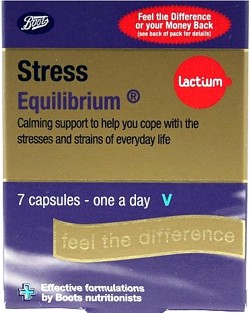 |
What does it do? This product contains Lactium, a unique ingredient which is proven to help with the stresses of every day life, helping you through a stressful day. Also contains B vitamins, magnesium and vitamin C, which help to support a healthy immune system and energy levels. Why is it different? This one a day supplement contains the patented ingredient Lactium. All Boots vitamins and suppliers are checked to ensure they meet our high quality and safety standards. |
So what is this "unique ingredient", Lactium? It is a produced by digestion of cow’s milk with trypsin. It was patented in 1995 by the French company, Ingredia, It is now distributed in the USA and Canada by Pharmachem. which describes itself as “a leader in the nutraceutical industry.” Drink a glass of milk and your digestive system will make it for you. Free. Boots charge you £4.99 for only seven capsules.
What’s the evidence?
The search doesn’t start well. A search of the medical literature with Pubmed for "lactium" produces no results at all. Search for "casein hydrolysate" gives quite a lot, but "casein hydrolysate AND stress" gives only seven, of which only one looks at effects in man, Messaoudi M, Lefranc-Millot C, Desor D, Demagny B, Bourdon L. Eur J Nutr. 2005.
There is a list of nineteen "studies" on the Pharmachem web site That is where Boots sent me when I asked about evidence, so let’s take a look.
Of the nineteen studies, most are just advertising slide shows or unpublished stuff. Two appear to be duplicated. There are only two proper published papers worth looking at, and one of these is in
rats not man. The human paper first.
Paper 1 Effects of a Bovine Alpha S1-Casein Tryptic Hydrolysate (CTH) on Sleep Disorder in Japanese General Population, Zara de Saint-Hilaire, Michaël Messaoudi, Didier Desor and Toshinori Kobayashi [reprint here] The authors come from France, Switzerland and Japan.
This paper was published in The Open Sleep Journal, 2009, 2, 26-32, one of 200 or so open access journals published by Bentham Science Publishers.
It has to be one of the worst clinical trials that I’ve encountered. It was conducted on 32 subjects, healthy Japanese men and women aged 25-40 and had reported sleeping disorders. It was double blind and placebo controlled, so apart from the fact that only 12 of the 32 subjects were in the control group, what went wrong?
The results were assessed as subjective sleep quality using the Japanese Pittsburg Sleep Quality Index (PSQI-J). This gave a total .score and seven component scores: sleep quality, sleep latency, sleep duration, habitual sleep efficiency, sleep disturbances, use of sleeping medication, and daytime dysfunction.
In the results section we read, for total PSQI score
"As shown in Table 2, the Mann-Whitney U-test did not show significant differences between CTH [casein tryptic hydrolysate] and Placebo groups in PSQI-J total scores at D0 (U=85; NS), D14 (U=86.5; NS), D28 (U=98.5; NS) and D35 (U=99.5; NS)."
Then we read exactly similar statements for the seven component scores. For example,. for Sleep Quality
As shown in Table 3, the Mann-Whitney U-test did not show significant differences between the sleep quality scores of CTH and Placebo groups at D0 (U=110.5; NS), D14 (U=108.5; NS), D28 (U=110; NS) and D35 (U=108.5; NS).
The discussion states
"The comparisons between the two groups with the test of Mann-Whitney did not show significant differences, probably because of the control product’s placebo effect. Despite everything, the paired comparisons with the test of Wilcoxon show interesting effects of CTH on sleep disorders of the treated subjects. "
Aha, so those pesky controls are to blame! But despite this negative result the abstract of the paper says
"CTH significantly improves the PSQI total score of the treated subjects. It particularly improves the sleep quality after two weeks of treatment, decreases the sleep latency and the daytime dysfunction after four weeks of treatment.
Given the antistress properties of CTH, it seems possible to relate the detected improvement of sleep aspects to a reduction of stress following its’ chronic administration."
So there seems to be a direct contradiction between the actual results and the announced outcome of the trial. How could this happen? The way that the results are presented make it hard to
tell. As far as I can tell, the answer is that, having failed to find evidence of real differences between CTH and placebo, the authors gave up on the placebo control and looked simply at the change
from the day 0 basleine values within the CTH group and, separately, within the placebo group. Some of these differences did pass statistical significance but if you analyse it
that way. there is no point in having a control group at all.
How on earth did such a poor paper get published in a peer-reviewed journal? One answer is that there are now so many peer-reviewed journals, that just about any paper, however poor, can get published
in some journal that describes itself as ‘peer-reviewed’. At the lower end of the status hierarchy, the system is simply broken.
Bentham Science Publishers are the publishers of the The Open Sleep Journal. (pity they saw fit to hijack the name of UCL’s spiritual founder, Jeremy Bentham). They publish 92 online and print journals, 200 plus open access journals, and related print/online book series. This publsher has a less than perfect reputation. There can be no scientist of any age or reputation who hasn’t had dozens of emails begging them to become editors of one or other of their journals or to write something for them. They have been described as a "pyramid scheme” for open access. It seems that every Tom, Dick and Harry has been asked. They have been described under the heading Black sheep among Open Access Journals and Publishers. More background can be found at Open Access News..
Most telling of all, a spoof paper was sent to a Bentham journal, The Open Information Science Journal. . There is a good account of the episode the New Scientist, under the title “CRAP paper accepted by journal”. It was the initiative if a graduate student at Cornell University. After getting emails from Bentham, he said “”It really painted a picture of vanity publishing”. The spoof paper was computer-generated rubbish, but it was accepted anyway, without comment. Not only did it appear that is was never reviewed but the editors even failed to notice that the authors said the paper came from the "Center for Research in Applied Phrenology", or CRAP. .The publication fee was $800, to be sent to a PO Box in the United Arab Emirates. Having made the point, the authors withdrew the paper.
Paper 5 in the list of nineteen stidies is also worth a look. It’s about rats not humans but it is in a respectable journal The FASEB Journal Express Article doi:10.1096/fj.00-0685fje (Published online June 8, 2001) [reprint here].
Characterization of α-casozepine, a tryptic peptide from bovine αs1-casein with benzodiazepine-like activity. Laurent Miclo et al.
This paper provides the basis for the claim that digested milk has an action like the benzodiazepine class of drugs, which includes diazepam (Valium). The milk hydrolysate, lactium was tested in rats and found to have some activity in tests that are alleged to measure effects on anxiety (I haven’t looked closely at the data, since the claims relate to humans).. The milk protein, bovine αS1 casein contains 214 amino acids. One of the many products of its digestion is a 10-amino-acid fragment (residues 91 -100) known as α-casozepine and this is the only product that was found to have an affinity for the γ-amino-butyric acid (GABA) type A receptors, which is where benzodiazepines are thought to act. There are a few snags with this idea.
- The affinity of α-casozepine peptide had 10,000-fold lower affinity for the benzodiazepine site of the GABAA than did diazepam, whereas allegedly the peptide was 10-fold more potent than diazepam in one of the rat tests.
- The is no statement anywhere of how much of the α-casozepine peptide is present in the stuff sold my Boots, or whether it can be absorbed
- And if digested milk did act like diazepam, it should clearly be callled a drug not a food.
What’s the conclusion about lactium?
Here is what I make of it.
Does it relieve stress? The evidence that it works any better than drinking a glass of milk is negligible. Tha advertising is grossly misleading and the price is extortionate.
Corruption of science. There is a more interesting aspect than that though. The case of lactium isn’t quite like the regular sort of alternative medicine scam. It isn’t inherently absurd, like homeopathy. The science isn’t the sort of ridiculous pseudo-scientific ramblings of magic medicine advocates who pretend it is all quantum theory The papers cited here are real papers, using real instruments and published in real journals,
What is interesting about that is that they show very clearly the corruption of real science that occurs at its fringes, This is science in the service of the dairy industry and in the service of the vast supplements industry. These are people who want to sell you a supplement for everything.
Medical claims are made for supplements, yet loopholes in the law are exploited to maintain that they are foods not drugs. The law and the companies that exploit it are deeply dishonest. That’s bad enough. but the real tragedy is when science itself is corrupted in the service of sales.
Big Pharma and the alternative industry. Nowhere is the slose alliance between Big Pharma and the alternative medicine industry more obvious than in the supplement and nutriceutical markets. Often the same companies run both. Their aim is to sell you thinks that you don’t need, for conditions that you may well not have, and to lighten your wallet in the process. Don’t believe for a moment that the dark-suited executives give a bugger about your health. You are a market to be exploited.
If you doubt that, look from time to time at one of the nutraceutical industry web sites, like nutraingredients.com. They even have a bit to say about lactium. They are particularly amusing at the moment because the European Food Safety Authority (EFSA) has had the temerity to demand that when health claims are made for foods, there is actually some small element of truth in the claims. The level of righteous indignation caused in the young food industry executives at the thought that they might have to tell the truth is everywhere to see. For example, try Life in a European health claims wasteland. Or, more relevant to Lactium, Opportunity remains in dairy bioactives despite departures. Here’s
a quotation from that one.
“Tage Affertsholt, managing partner at 3A Business Consulting, told NutraIngredients.com that the feedback from industry is that the very restrictive approach to health claims adopted by the European Food Safety Authority (EFSA) will hamper growth potential.”
“Affertsholt said: “Some companies are giving up and leaving the game to concentrate on more traditional dairy ingredients.”
Science and government policy
It may not have escaped your notice that the sort of low grade, corrupted, fringe science described here, is precisely the sort that is being encouraged by government policies. You are expected to get lots of publications, so never mind the details, just churn ’em out; The hundreds of new journals that have been created will allow you to get as meny peer-reviwed publications as you want without too much fuss, and you can very easily put an editorship of one of them on your CV when you fill in that bit about indicators of esteem. The box tickers in HR will never know that it’s a mickey mouse journal.
Follow-up
Boots own up to selling crap
Although this post was nothing to do with joke subjects like homeopathy, it isn’t possible to write about Boots without mentioning the performance of their professional standards director, Paul Bennett, when he appeared before the Parliamentary Select Committee for Science and Technology.. This committee was holding an “evidence check” session on homeopathy (it’s nothing short of surreal that this should be happening in 2009, uh?). The video can be seen here, and an uncorrected transcript. It is quite fun in places. You can also read the written evidence that was submitted.
Even the Daily Mail didn’t misss this one. Fioana Macrae wrote Boots boss admits they sell homeopathic remedies ‘because they’re popular, not because they work’
“It could go down as a Boot in Mouth moment.
Yesterday, the company that boasts shelf upon shelf of arnica, St John’s wort, flower remedies and calendula cream admitted that homeopathy doesn’t necessarily work.
But it does sell. Which according to Paul Bennett, the man from Boots, is why the pharmacy chain stocks such products in the first place.
Mr Bennett, professional standards director for Boots, told a committee of MPs that there was no medical evidence that homeopathic pills and potions work.
‘There is certainly a consumer demand for these products,’ he said. ‘I have no evidence to suggest they are efficacious.
‘It is about consumer choice for us and a large number of our customers believe they are efficacious.’
His declaration recalls Gerald Ratner’s infamous admission in 1991 that one of the gifts sold by his chain of jewellers was ‘total crap’.”
The Times noticed too, with Boots ‘labels homeopathy as effective despite lack of evidence‘.
Now you know that you can’t trust Boots. You heard it from the mouth of their professional standards director.
A commentary on the meeting by a clinical scientist summed up Bennett’s contribution thus
"Paul Bennett from Boots had to admit that there was no evidence, but regaled the committee with the mealy-mouthed flannel about customer choice that we have come to expect from his amoral employer."
Well said
The third session of the Scitech evidence check can be seen here, and the uncorrected transcript is here. It is, in a grim way, pure comedy gold, More of that later.
It is almost six months now since I posted Quackery creeps into good universities too -but through Human Resources. One example given there was the University of Leicester. This is an excellent university. It does first class research and it was the alma mater of the incomparable David Attenborough who has done more than anyone to show us the true beauty and wonder of the natural world.
Nevertheless, their well-meaning occupational health department had a section about “complementary therapies” that contained a lot of statements that were demonstrably untrue. They even recommended the utterly outrageous SCENAR device. So I pointed this out to them, and I had a quick and sympathetic response from their HR director.
But three months later, nothing had changed. Every now and then, I’d send a polite reminder, but it seemed the occupational health staff were very wedded to their quackery. The last reminder went on 6th February, but this time I copied it to Leicester’s vice-chancellor. This time it worked. There is still a link to Complementary Therapies on the Wellbeing site, but if you click on it, this is what you see.
Complementary therapiesSome employees may have an interest in complementary therapies such as acupuncture, yoga, Indian head massage, Reiki, sports & remedial massage, reflexology and hypnotherapy. If you have an interest in any of these, Staff Counselling can happily provide details of practitioners in the local area. Some of these practitioners offer discounts from their normal rates for University of Leicester staff. However, the University of Leicester cannot vouch for, or recommend any of these therapies to staff as being effective. We would urge members of staff who believe that such therapies might be effective to contact their GP prior to undertaking any of them. Further, the University of Leicester shall not be liable for any damage of any kind arising out of or related to the services of any complementary therapists or treatments listed here. If you would like further information, please contact Chris Wilson at: staffcounsel&welfare@le.ac.uk or telephone 1702. |
That’s not bad. Pity it doesn’t say alternative, rather than complementary though. Euphemisms aren’t really helpful.
In fact I have a bit of a problem with “wellbeing” too. It is a harmless word that has been highjacked so that its use now makes one think of mud baths provided by expensive hotels for their rich and gullible customers.
Leicester’s HR director wrote
“Unfortunately an instruction I had given previously had not been fully complied with. I spoke to the manager of the Staff Counselling team on Friday and gave clear instructions as to the content of this site. I had been assured that the offending information had been removed, but found that it had not.
I have now checked the site for myself and can say, with confidence, that all claims for the efficacy of complimentary [sic] therapies have been removed including SCENAR.”
The similarity between quack treatments and religion is intriguing. It seems that the devotion of the occupational health people to their baloney was so great that they wouldn’t take it down even when told to do so. The more irrational the belief, the greater the fervour with which it is defended,
What’s the lesson from this minor saga? It seems that most VCs and many HR people are too sensible to believe in alternative baloney, but that they are a bit too ready to tolerate it, perhaps on grounds of political correctness. Tolerance is a virtue, but lies about health are not in the least virtuous. If you point out that people are saying things for which there isn’t the slightest evidence, they will often respond. Just be prepared to send a few reminders.
It may also be useful to point out that some of the claims made are almost certainly illegal. Even people who care little about evidence of efficacy are impressed by the idea that they might be prosecuted by Trading Standards officers.
Who needs mystical medicine when you have real wonders like these.
(Click the google video logo for a bigger version)
Or try the pitcher plant video, or the Bird of paradise, or the Bower Bird, or the giant Amazon lilies.
Follow-up
It’s only a matter of weeks since a lot of young scientists produced a rather fine pamphlet pointing out that the “detox” industry is simply fraud. They concluded
“There is little or no proof that these products work, except to part people from their cash.”
With impeccable timing, Duchy Originals has just launched a “detox” product.
Duchy Originals is a company that was launched in 1990 by the Prince of Wales, Up to now, it has limited itself to selling overpriced and not particularly healthy stuff like Chocolate Butterscotch Biscuits and Sandringham Strawberry Preserve. Pretty yummy if you can afford them.
The move of HRH into herbal concoctions was first noted in the blogosphere (as usual) in December, by Quackometer. It was reported recently in the Daily Telegraph (23rd January).
Expect a media storm.

Aha so it is a “food supplement” not a drug. Perhaps Duchy Originals have not noticed that there are now rather strict regulations about making health claims for foods?
And guess who’s selling it? Yes our old friend, for which no deception is too gross, Boots the Chemists.
That’s £10 for 50 ml. Or £200 per litre.
And what’s in it?
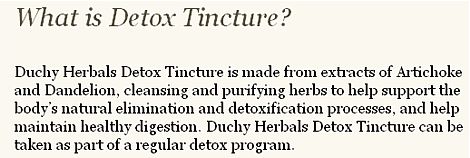
Problem 1. The word detox has no agreed meaning. It is a marketing word, designed to separate the gullible from their money
Problem 2. There isn’t the slightest reason to think that either artichoke or dandelion will help with anything at all. Neither appears at all in the Cochrane reviews. So let’s check two sources that are both compiled by CAM sympathisers (just so I can’t be accused of prejudice).
National Electronic Library of CAM (NELCAM) reveals nothing useful.
- There is no good evidence that artichoke leaf extract works for lowering cholesterol. No other indications are mentioned.
- Dandelion doesn’t get any mention at all.
The US National Center for Complementary and Alternative Medicine (NCCAM) has spent almost $1 billion on testing alternative treatments So far they have produced no good new remedies (see also Integrative baloney @ Yale).They publish a database of knowledge about herbs. This is what they say.
- Dandelion. There is no compelling scientific evidence for using dandelion as a treatment for any medical condition.
- Artichoke isn’t even mentioned anywhere.
If “detox” is meant to be a euphemism for hangover cure, then look at the review by Pittler et al (2005), ‘Interventions for preventing or treating alcohol hangover: systematic review of randomised controlled trials’.
“Conclusion No compelling evidence exists to suggest that any conventional or complementary intervention is effective for preventing or treating alcohol hangover. The most effective way to avoid the symptoms of alcohol induced hangover is to practise abstinence or moderation.”
Problem 3. The claim that the product is “cleansing and purifying” is either meaningless or false. Insofar as it is meaningless, it is marketing jargon that is designed to deceive. The claim that it supports “the body’s natural elimination and detoxification processes, and helps maintain healthy digestion” is baseless. It is a false health claim that, prima facie, is contrary to the Unfair Trading law, and/or European regulation on nutrition and health claims made on food, ref 1924/2006 , and which therefore should result in prosecution.
Two more Duchy herbals
Duchy are selling also Echinacea and Hypericum (St John’s Wort).
The evidence that Echinacea helps with colds is, to put it mildly, very marginal.
Of St John’s Wort, NCCAM says
“There is some scientific evidence that St. John’s wort is useful for treating mild to moderate depression. However, two large studies, one sponsored by NCCAM, showed that the herb was no more effective than placebo in treating major depression of moderate severity.”
As well as having dubious effectiveness it is well known that St John’s Wort can interact with many other drugs, a hazard that is not mentioned by Duchy Originals
These two are slightly different because they appear to have the blessing of the MHRA.
The behaviour of the MHRA in ignoring the little question of whether the treatment works or not has been condemned widely. But at least the MHRA are quite explicit. This is what the MHRA says of St. John’s Wort (my emphasis).
“This registration is based exclusively upon evidence of traditional use of Hypericum perforatum L. as a herbal medicine and not upon data generated from clinical trials.. There is no requirement under the Traditional Herbal Registration scheme to prove scientifically that the product works.“
But that bit about “There is no requirement under the Traditional Herbal Registration scheme to prove scientifically that the product works” does not appear in the Duchy Originals advertisement. On the contrary, this is what they say.

Yes, they claim that “the two tinctures [echinacea and hypericum] -in terms of their safety, quality and efficacy -by the UK regulatory authorities”
That is simply not true.
On the contrary, anyone without specialist knowledge would interpret bits like these as claims that there will be a health benefit.
![]()
That is claim to benefit your health. So are these.
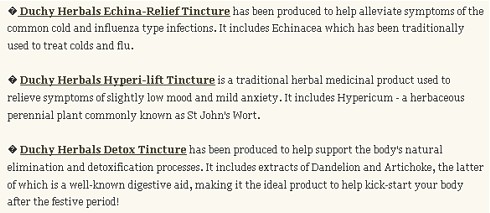
Who makes them?

Michael McIntyre is certainly a high profile herbalist.
He was founder president of the European Herbal Practitioners Association and a trustee of the Prince of Wales’s Foundation for Integrated Medicine. It seems that he a great believer in the myth of “detox”, judging by his appearance on the Firefly tonics web site. They will sell you
“Natural healthy energy” in a drink
That’s what we wanted…
A Wake up for that drowsy afternoon… Detox for a dodgy Friday morning…
Sharpen up for that interminable meeting.
We left the herbs to our wonderful herbalists.
Their De-tox contains lemon, lime, ginger, sarsparilla and angelica. I expect it tastes nice. All the rest is pure marketing rubbish. It does not speak very well of Michael McIntyre that he should lend his name to such promotions.
Nelsons, who actually make the stuff, is better known as a big player in the great homeopathic fraud business. They will sell you 30C pills of common salt at £4.60 for 84. Their main health-giving virtue is that they’re salt free.
If you want to know what use they are, you are referred here, where it is claimed that it is “used to treat watery colds, headaches, anaemia, constipation, and backache”. Needless to say there isn’t a smidgeon of reason to believe it does the slightest good for them.
And remember what Nelson’s advisor at their London pharmacy told BBC TV while recommending sugar pills to prevent malaria?
“They make it so your energy doesn’t have a malaria-shaped hole in it so the malarial mosquitos won’t come along and fill that in.”
You couldn’t make it up.
The Prince of Wales has some sensible things to say in other areas, such as the world’s over-reliance on fossil fuels. Even his ideas about medicine are, no doubt, well-intentioned. It does seem a shame that he just can’t get the hang of the need for evidence. Wishful thinking just isn’t enough.
Follow-up
Some more interesting reading about the Prince of Wales.
Michael Baum’s An open letter to the Prince of Wales: with respect, your highness, you’ve got it wrong”
Gerald Weissman’s essay Homeopathy: Holmes, Hogwarts, and the Prince of Wales.
Channel 4 TV documentary HRH “meddling in politics”
11 March 2009 The MHRA have censured Duchy Originals for the claims made for these products. and in May 2009, two complaints to the Advertising Standards Authority were upheld.
I’m perfectly happy to think of alternative medicine as being a voluntary, self-imposed tax on the gullible (to paraphrase Goldacre again). But only as long as its practitioners do no harm and only as long as they obey the law of the land. Only too often, though, they do neither.
When I talk about law, I don’t mean lawsuits for defamation. Defamation suits are what homeopaths and chiropractors like to use to silence critics. heaven knows, I’ve becomes accustomed to being defamed by people who are, in my view. fraudsters, but lawsuits are not the way to deal with it.
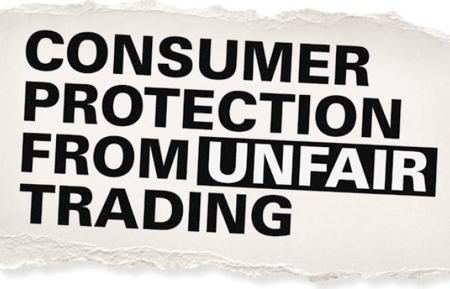
I’m talking about the Trading Standards laws Everyone has to obey them, and in May 2008 the law changed in a way that puts the whole health fraud industry in jeopardy.
The gist of the matter is that it is now illegal to claim that a product will benefit your health if you can’t produce evidence to justify the claim.
I’m not a lawyer, but with the help of two lawyers and a trading standards officer I’ve attempted a summary. The machinery for enforcing the law does not yet work well, but when it does, there should be some very interesting cases.
The obvious targets are homeopaths who claim to cure malaria and AIDS, and traditional Chinese Medicine people who claim to cure cancer.
But there are some less obvious targets for prosecution too. Here is a selection of possibilities to savour..
- Universities such as Westminster, Central Lancashire and the rest, which promote the spreading of false health claims
- Hospitals, like the Royal London Homeopathic Hospital, that treat patients with mistletoe and marigold paste. Can they produce any real evidence that they work?
- Edexcel, which sets examinations in alternative medicine (and charges for them)
- Ofsted and the QCA which validate these exams
- Skills for Health and a whole maze of other unelected and unaccountable quangos which offer “national occupational standards” in everything from distant healing to hot stone therapy, thereby giving official sanction to all manner of treatments for which no plausible evidence can be offered.
- The Prince of Wales Foundation for Integrated Health, which notoriously offers health advice for which it cannot produce good evidence
- Perhaps even the Department of Health itself, which notoriously referred to “psychic surgery” as a profession, and which has consistently refused to refer dubious therapies to NICE for assessment.
The law, insofar as I’ve understood it, is probably such that only the first three or four of these have sufficient commercial elements for there to be any chance of a successful prosecution. That is something that will eventually have to be argued in court.
But lecanardnoir points out in his comment below that The Prince of Wales is intending to sell herbal concoctions, so perhaps he could end up in court too.
The laws
We are talking about The Consumer Protection from Unfair Trading Regulations 2008. The regulations came into force on 26 May 2008. The full regulations can be seen here, or download pdf file. They can be seen also on the UK Statute Law Database.
The Office of Fair Trading, and Department for Business, Enterprise & Regulatory Reform (BERR) published Guidance on the Consumer Protection from Unfair Trading Regulations 2008 (pdf file),
Statement of consumer protection enforcement principles (pdf file), and
The Consumer Protection from Unfair Trading Regulations: a basic guide for business (pdf file).
Has The UK Quietly Outlawed “Alternative” Medicine?
On 26 September 2008, Mondaq Business Briefing published this article by a Glasgow lawyer, Douglas McLachlan. (Oddly enough, this article was reproduced on the National Center for Homeopathy web site.)
“Proponents of the myriad of forms of alternative medicine argue that it is in some way “outside science” or that “science doesn’t understand why it works”. Critical thinking scientists disagree. The best available scientific data shows that alternative medicine simply doesn’t work, they say: studies repeatedly show that the effect of some of these alternative medical therapies is indistinguishable from the well documented, but very strange “placebo effect” ”
“Enter The Consumer Protection from Unfair Trading Regulations 2008(the “Regulations”). The Regulations came into force on 26 May 2008 to surprisingly little fanfare, despite the fact they represent the most extensive modernisation and simplification of the consumer protection framework for 20 years.”
The Regulations prohibit unfair commercial practices between traders and consumers through five prohibitions:-
- General Prohibition on Unfair Commercial
Practices (Regulation 3)- Prohibition on Misleading Actions (Regulations 5)
- Prohibition on Misleading Omissions (Regulation 6)
- Prohibition on Aggressive Commercial Practices (Regulation 7)
- Prohibition on 31 Specific Commercial Practices that are in all Circumstances Unfair (Schedule 1). One of the 31 commercial practices which are in all circumstances considered unfair is “falsely claiming that a product is able to cure illnesses, dysfunction or malformations”. The definition of “product” in the Regulations includes services, so it does appear that all forms medical products and treatments will be covered.
Just look at that!
| One of the 31 commercial practices which are in all circumstances considered unfair is “falsely claiming that a product is able to cure illnesses, dysfunction or malformations” |
Section 5 is equally powerful, and also does not contain the contentious word “cure” (see note below)
Misleading actions
5.—(1) A commercial practice is a misleading action if it satisfies the conditions in either paragraph (2) or paragraph (3).
(2) A commercial practice satisfies the conditions of this paragraph—
(a) if it contains false information and is therefore untruthful in relation to any of the matters in paragraph (4) or if it or its overall presentation in any way deceives or is likely to deceive the average consumer in relation to any of the matters in that paragraph, even if the information is factually correct; and
(b) it causes or is likely to cause the average consumer to take a transactional decision he would not have taken otherwise.
These laws are very powerful in principle, But there are two complications in practice.
One complication concerns the extent to which the onus has been moved on to the seller to prove the claims are true, rather than the accuser having to prove they are false. That is a lot more favourable to the accuser than before, but it’s complicated.
The other complication concerns enforcement of the new laws, and at the moment that is bad.
Who has to prove what?
That is still not entirely clear. McLachlan says
“If we accept that mainstream evidence based medicine is in some way accepted by mainstream science, and alternative medicine bears the “alternative” qualifier simply because it is not supported by mainstream science, then where does that leave a trader who seeks to refute any allegation that his claim is false?
Of course it is always open to the trader to show that his the alternative therapy actually works, but the weight of scientific evidence is likely to be against him.”
On the other hand, I’m advised by a Trading Standards Officer that “He doesn’t have to refute anything! The prosecution have to prove the claims are false”. This has been confirmed by another Trading Standards Officer who said
“It is not clear (though it seems to be) what difference is implied between “cure” and “treat”, or what evidence is required to demonstrate that such a cure is false “beyond reasonable doubt” in court. The regulations do not provide that the maker of claims must show that the claims are true, or set a standard indicating how such a proof may be shown.”
The main defence against prosecution seems to be the “Due diligence defence”, in paragraph 17.
Due diligence defence
17. —(1) In any proceedings against a person for an offence under regulation 9, 10, 11 or 12 it is a defence for that person to prove—
(a) that the commission of the offence was due to—
(i) a mistake;
(ii) reliance on information supplied to him by another person;
(iii) the act or default of another person;
(iv) an accident; or
(v) another cause beyond his control; and
(b) that he took all reasonable precautions and exercised all due diligence to avoid the commission of such an offence by himself or any person under his control.
If “taking all reasonable precautions” includes being aware of the lack of any good evidence that what you are selling is effective, then this defence should not be much use for most quacks.
Douglas McLachlan has clarified, below, this difficult question
False claims for health benefits of foods
A separate bit of legislation, European regulation on nutrition and health claims made on food, ref 1924/2006, in Article 6, seems clearer in specifying that the seller has to prove any claims they make.
Article 6
Scientific substantiation for claims
1. Nutrition and health claims shall be based on and substantiated by generally accepted scientific evidence.
2. A food business operator making a nutrition or health claim shall justify the use of the claim.
3. The competent authorities of the Member States may request a food business operator or a person placing a product on the market to produce all relevant elements and data establishing compliance with this Regulation.
That clearly places the onus on the seller to provide evidence for claims that are made, rather than the complainant having to ‘prove’ that the claims are false.
On the problem of “health foods” the two bits of legislation seem to overlap. Both have been discussed in “Trading regulations and health foods“, an editorial in the BMJ by M. E. J. Lean (Professor of Human Nutrition in Glasgow).
“It is already illegal under food labelling regulations (1996) to claim that food products can treat or prevent disease. However, huge numbers of such claims are still made, particularly for obesity ”
“The new regulations provide good legislation to protect vulnerable consumers from misleading “health food” claims. They now need to be enforced proactively to help direct doctors and consumers towards safe, cost effective, and evidence based management of diseases.”
In fact the European Food Standards Agency (EFSA) seems to be doing a rather good job at imposing the rules. This, predictably, provoked howls of anguish from the food industry There is a synopsis here.
“Of eight assessed claims, EFSA’s Panel on Dietetic Products, Nutrition and Allergies (NDA) rejected seven for failing to demonstrate causality between consumption of specific nutrients or foods and intended health benefits. EFSA has subsequently issued opinions on about 30 claims with seven drawing positive opinions.”
“. . . EFSA in disgust threw out 120 dossiers supposedly in support of nutrients seeking addition to the FSD’s positive list.
If EFSA was bewildered by the lack of data in the dossiers, it needn’t hav been as industry freely admitted it had in many cases submitted such hollow documents to temporarily keep nutrients on-market.”
Or, on another industry site, “EFSA’s harsh health claim regime”
“By setting an unworkably high standard for claims substantiation, EFSA is threatening R&D not to mention health claims that have long been officially approved in many jurisdictions.”
Here, of course,”unworkably high standard” just means real genuine evidence. How dare they ask for that!
Enforcement of the law
Article 19 of the Unfair Trading regulations says
19. —(1) It shall be the duty of every enforcement authority to enforce these Regulations.
(2) Where the enforcement authority is a local weights and measures authority the duty referred to in paragraph (1) shall apply to the enforcement of these Regulations within the authority’s area.
Nevertheless, enforcement is undoubtedly a weak point at the moment. The UK is obliged to enforce these laws, but at the moment it is not doing so effectively.
A letter in the BMJ from Rose & Garrow describes two complaints under the legislation in which it appears that a Trading Standards office failed to enforce the law. They comment
” . . . member states are obliged not only to enact it as national legislation but to enforce it. The evidence that the government has provided adequate resources for enforcement, in the form of staff and their proper training, is not convincing. The media, and especially the internet, are replete with false claims about health care, and sick people need protection. All EU citizens have the right to complain to the EU Commission if their government fails to provide that protection.”
This is not a good start. A lawyer has pointed out to me
“that it can sometimes be very difficult to get Trading Standards or the OFT to take an interest in something that they don’t fully understand. I think that if it doesn’t immediately leap out at them as being false (e.g “these pills cure all forms of cancer”) then it’s going to be extremely difficult. To be fair, neither Trading Standards nor the OFT were ever intended to be medical regulators and they have limited resources available to them. The new Regulations are a useful new weapon in the fight against quackery, but they are no substitute for proper regulation.”
Trading Standards originated in Weights and Measures. It was their job to check that your pint of beer was really a pint. Now they are being expected to judge medical controversies. Either they will need more people and more training, or responsibility for enforcement of the law should be transferred to some more appropriate agency (though one hesitates to suggest the MHRA after their recent pathetic performance in this area).
Who can be prosecuted?
Any “trader”, a person or a company. There is no need to have actually bought anything, and no need to have suffered actual harm. In fact there is no need for there to be a complainant at all. Trading standards officers can act on their own. But there must be a commercial element. It’s unlikely that simply preaching nonsense would be sufficient to get you prosecuted, so the Prince of Wales is, sadly, probably safe.
Universities who teach that “Amethysts emit high Yin energy” make an interesting case. They charge fees and in return they are “falsely claiming that a product is able to cure illnesses”.
In my view they are behaving illegally, but we shan’t know until a university is taken to court. Watch this space.
The fact remains that the UK is obliged to enforce the law and presumably it will do so eventually. When it does, alternative medicine will have to change very radically. If it were prevented from making false claims, there would be very little of it left apart from tea and sympathy
Follow-up
New Zealand must have similar laws.
Just as I was about to post this I found that in New Zealand a
“couple who sold homeopathic remedies claiming to cure bird flu, herpes and Sars (severe acute respiratory syndrome) have been convicted of breaching the Fair Trading Act.”
They were ordered to pay fines and court costs totalling $23,400.
A clarification form Douglas McLachlan
On the difficult question of who must prove what, Douglas McLachlan, who wrote Has The UK Quietly Outlawed “Alternative” Medicine?, has kindly sent the following clarification.
“I would agree that it is still for the prosecution to prove that the trader committed the offence beyond a reasonable doubt, and that burden of proof is always on the prosecution at the outset, but I think if a trader makes a claim regarding his product and best scientific evidence available indicates that that claim is false, then it will be on the trader to substantiate the claim in order to defend himself. How will the trader do so? Perhaps the trader might call witness after witness in court to provide anecdotal evidence of their experiences, or “experts” that support their claim – in which case it will be for the prosecution to explain the scientific method to the Judge and to convince the Judge that its Study evidence is to be preferred.
Unfortunately, once human personalities get involved things could get clouded – I could imagine a small time seller of snake oil having serious difficulty, but a well funded homeopathy company engaging smart lawyers to quote flawed studies and lead anecdotal evidence to muddy the waters just enough for a Judge to give the trader the benefit of the doubt. That seems to be what happens in the wider public debate, so it’s easy to envisage it happening a courtroom.”
The “average consumer”.
(3) A commercial practice is unfair if—
(a) it contravenes the requirements of professional diligence; and
(b) it materially distorts or is likely to materially distort the economic behaviour of the average consumer with regard to the product.
It seems,therefore, that what matters is whether the “average consumer” would infer from what is said that a claim was being made to cure a disease. The legal view cited by Mojo (comment #2, below) is that expressions such as “can be used to treat” or “can help with” would be considered by the average consumer as implying successful treatment or cure.
The drugstore detox delusion. A nice analysis “detox” at .Science-based Pharmacy
Sense about Science have just produced a rather good pamphlet that exposes, yet again. the meaningless marketing slogan “detox”. You can download the pamphlet from their web site.
The pamphlet goes through the claims of eleven products. Needless to say, the claims are either meaningless, or simply untrue.
- Garnier Clean Detox Anti-Dullness Foaming Gel
“Detoxifies by cleansing the skin’s surface” - MG Detox Shampoo Trevor Sorbie
“Deep cleansing and clarifying shampoo” - Boots Detox Body Brush
“Ritualistic body brushing helps expel toxins through the skin” - Innocent Natural Detox Smoothie
“Helps neutralise nasty free radicals which can cause damage to your body’s cells” - Vitabiotics Detoxil 15 day support
“Helps the body cleanse itself of toxins and pollutants caused by the excesses of a busy life” - V-Water Detox
“Cleanse your system and whisk away the polluting nasties” - 4321 Shape Up and Detox
“To drain off water and toxins” and “purify the body” - Boots Detox 5 Day Plan
Works “in harmony with your body to flush away toxins” - Farmacia Spa Therapy Detox range
To “rid your body of these damaging toxins” - Crystal Spring Detox patches
“I’m the easy way to detox, just put me on one foot at night and take me off in the morning” - Fushi Holistic and Health Solutions Total Detox Patch
“it acts as a toxin sink and absorbs impurities through your feet”
One nice thing about the pamphlet is that each item is written by a young scientist (including my close neighbour, Daniella Muallem). They are all people at an early stage in their career, but they care enough to spend time dissecting the rubbish spread by companies in order to part you from your money.
Garnier, it’s true, is a cosmetics company, so one expects nothing but lies You won’t be disappointed on that score.
That least ethical of pharmaceutical companies, Boots, appears twice The Boots Detox Body Brush is reviewed by a young chemist, Tom Wells. It turns out (there’s a surprise) to be nothing more than an ordinary stiff brush. It seems that Boots’ definition of “detox”, for this purpose, is “removing dead skin cells” A totally shameless con, in other words.
The Boots Detox 5 day plan consists if 5 phials of apple or strawberry flavoured goo containing two vitamins and one mineral, mixed with glycerol. In this case the young investigator, Evelyn Harvey, elicited a quite remarkable response from Boots.
Well, have you tested the effects of that diet, with or without the detox product? Does the ‘goo’ stuff [the drink which forms part of the plan] add anything extra?
Well, it’s meant to kick start it.
But has is been tested like that?
No.
Ok, I’m thinking I’ll just try a healthy diet for a week, a bit more exercise, and not bother with buying the detox.
Yes, that sounds like a better idea, to be honest I’d never do this myself.
The media coverage
The Radio 4 Today programme interviewed Ben Goldacre and the managing director of yet another product “Detox in a box” (following their usual policy of equal time for the Flat Earth Society). Listen to the mp3. When Ben Goldacre asked the MD for evidence for the claim made on the web site of Detox in a box, that their diet could remove cadmium from the body, it was denied explicitly that any such claim had been made.
Not so.

But by 10.02 the site had already changed
![]()
So no apology for the mistake. Just a sneaky removal of a few words.
That seems to be the only change though. All the rest of the nutribollocks is still there. For example

There isn’t the slightest reason to believe that it will “improve our immune function”.
There isn’t the slightest reason to think that scavenging free radicals would do you any good, even if it happened.
There isn’t the slightest reason to think it will strengthen body’s fight against cancer cells (that looks like a breach of the Cancer Act to me).
“Cleansing mucous” doesn’t mean much, but whatever it is there isn’t any reason to think its true.
“Purify our blood”. Total meaningless bollocks. The words mean nothing at all. I’ve been here before.
Ben Goldacre’s own account is here “The barefaced cheek of these characters will never cease to amaze and delight me.”
The BBC web site does a good job too.
The Guardian gives an excellent account (James Randerson).
The Daily Mail writes “Detox diets to kick-start the New Year are a ‘total waste of money’ “.
Medical News Today write “Debunking The Detox Myth“.
The Daily Telegraph disgraces itself by not only failing to carry a decent account of the item, but it does run an article on “Detox holidays: New year, new you“. Mega-expensive holidays for the mega-stupid (not to mention the capital letter after the colon).
The Daily Mash provides a bit of cognate fun with “BRITAIN SIGNS UP FOR VORDERMAN’S 28-DAY PISS-DRINK DETOX“. That alludes to “Carol Vorderman’s 28-Day Detox Diet”. A woman who got an enormous salary for playing a parlour game on TV, and has done some good for maths education, is reduced to promoting nonsense for yet more money.
As Clive James pointed out, it’s a but like watching George Clooney advertising coffee for, of all unethical companies, Nestlé. They really look very silly.
Follow-up
Evening Standard 6th January. Nick Cohen writes “Give up detox – it’s bad for your health”
“Giving up on detox should not be painful, however. On the contrary, it should e a life-enhancing pleasure.”
The Times. rather later (January 18th) had a lovely one, “Detox
Debunked“, by the inimitable Ben Goldacre, His account of /detox; as a quasi-religious ‘cleansing ritual’, is spot on.
Alfred Joseph Clark FRS held the established chair of Pharmacology at UCL from 1919 to 1926, when he left for Edinburgh. In the 1920s and 30s, Clark was a great pioneer in the application of quantitative physical ideas to pharmacology. As well as his classic scientific works, like The Mode of Action of Drugs on Cells (1933) he wrote, and felt strongly, about the fraud perpetrated on the public by patent medicine salesmen. In 1938 (while in Edinburgh) he published a slim volume called Patent Medicines. The parallels with today are astonishing.
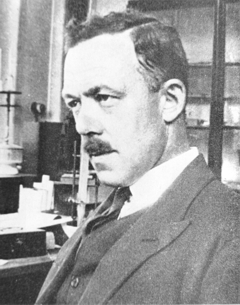 
Alfred Joseph Clark FRS (1885 – 1941) |
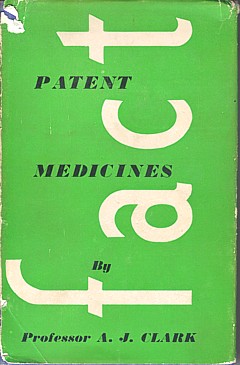 |
I was lucky to be given a copy of this book by David Clark, A.J. Clark’s eldest son, who is now 88. I visited him in Cambridge on 17 September 2008, because he thought that, as holder of the A.J. Clark chair at UCL from 1985 to 2004, I’d be a good person to look after this and several other books from his father’s library. They would have gone to the Department of Pharmacology if we still had one, but that has been swept away by mindless administrators with little understanding of how to get good science.
Quotations from the book are in italic, and are interspersed with comments from me.
The book starts with a quotation from the House of Commons Select Committee report on Patent Medicines. The report was submitted to the House on 4 August 1914, so there is no need to explain why it had little effect. The report differs from recent ones in that it is not stifled by the sort of political correctness that makes politicians refer to fraudsters as “professions”.
The problem
“2.2 The situation, therefore, as regards the sale and advertisement of proprietary medicines and articles may be summarised as follows:
For all practical purposes British law is powerless to prevent any person from procuring any drug, or making any mixture, whether patent or without any therapeutical activity whatever (as long as it does not contain a scheduled poison), advertising it in any decent terms as a cure for any disease or ailment, recommending it by bogus testimonials and the invented opinions and facsimile signatures of fictitious physicians, and selling it under any name he chooses, on payment of a small stamp duty. For any price he can persuade a credulous public to pay.”
Select Committee on Patent Medicines. 1914
“The writer has endeavoured in the present article to analyse the reasons for the amazing immunity of patent medicines form all attempts to curb their activity, to estimate the results and to suggest the obvious measures of reform that are needed.”
| Clark, writing in 1938, was surprised that so little had changed since 1914. What would he have thought if he had known that now, almost 100 years after the 1914 report, the fraudsters are still getting away with it? Chapter 2 starts thus. |
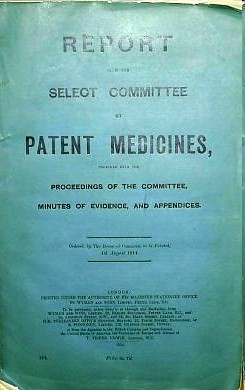 |
THE LAW
The Select Committee appointed by the House of Commons in 1914 ‘to consider and inquire into the question of the sale of Patent and Proprietary Medicines’ stated its opinion in 28 pages of terse and uncompromising invective. Its general conclusions were as follows:
That the trade in secret remedies constituted a grave and widespread public evil.
That the existing law was chaotic and had proved inoperative and that consequently the traffic in secret remedies was practically uncontrolled.
In particular it concluded ‘”that this is an intolerable state of things and that new legislation to deal with it, rather than merely the amendment of existing laws, is urgently needed in the public interest.”
The “widespread public evil”continues almost unabated, and rather than introduce sensible legislation to cope with it, the government has instead given a stamp of approval for quackery by introducing utterly ineffective voluntary “self-regulation”.
Another Bill to deal with patent medicines was introduced in 1931, without success, and finally in 1936, a Medical and Surgical Appliances (Advertisement) Bill was introduced. This Bill had a very limited scope. Its purpose was to alleviate some of the worst abuses of the quack medicine trade by prohibiting the advertisement of cures for certain diseases such as blindness, Bright’s disease [nephritis] , cancer, consumption [tuberculosis], epilepsy, fits, locomotor ataxy, fits, lupus or paralysis.
The agreement of many interests was secured for this measure. The president of the Advertising Association stated that the proposed Bill would not affect adversely any legitimate trade interest. Opposition to the Bill was, however, whipped up amongst psychic healers, anti-vivisectionists and other opponents of medicine and at the second reading in March 1936, the Bill was opposed and the House was counted out during the ensuing debate. The immediate reason for this fate was that the Bill came up for second reading on the day of the Grand National! This is only one example of the remarkable luck that has attended the patent medicine vendors.
(Page 14).
The “remarkable luck” of patent medicine vendors continues to this day, Although, in principle, advertisement of cures for venereal diseases was banned in 1917, and for cancer in 1939, it takes only a few minutes with Google to find that these laws are regularly flouted by quacks, In practice quacks get away with selling vitamin pills for AIDS, sugar pills for malaria and homeopathic pills for rabies, polio anthrax and just about anything else you can think of. Most of these advertisements are contrary to the published codes of ethics of the organisations to which the quack in question belongs but nothing ever happens.
Self-regulation simply does not work, and there is still no effective enforcement even of existing laws..
“It has already been stated that British law allows the advertiser of a secret remedy to tell any lie or make any claim that he fancies will sell his goods and the completeness of this licence is best illustrated by the consideration of a few specific points.
Advertisements for secret remedies very frequently contain a list of testimonials from medical men, which usually are in an anonymous form, stating that ………….. M.D., F.R.C.S., has found the remedy infallible. Occasionally, however, the name and address of a doctor is given and anyone unaware of the vagaries of English law would imagine that such use of a doctor’s name and professional reputation could not be made with impunity without his consent. In 1899, however, the Sallyco Mineral Water Company advertised that ‘Dr. Morgan Dochrill, physician to St. John’s Hospital, London and many of the leading physicians are presenting ‘Sallyco’ as an habitual drink. Dr. Dochrill says nothing has done his gout so much good.
Dr. Dochrill, whose name and title were correctly stated above, sued the company but failed in his case. ”
“The statement that the law does not prevent the recommending of a secret remedy by the use of bogus testimonials and facsimile signatures of fictitious physicians is obviously an understatement since it is doubtful how far it interferes with the use of bogus testimonials from real physicians.”
Dodgy testimonials are still a mainstay of dodgy salesman. One is reminded of the unauthorised citation of testimonials from Dr John Marks and Professor Jonathan Waxman by Patrick Holford to aid his sales of unnecessary vitamin supplements. There is more on this at Holfordwatch.
The man in the street knows that the merits of any article are usually exaggerated in advertisements and is in the habit of discounting a large proportion of such claims, but, outside the realm of secret remedies, the law is fairly strict as regards definite misstatements concerning goods offered for sale and hence the everyday experience of the man in the street does not prepare him for dealing with advertisements which are not merely exaggerations but plain straightforward lies from beginning to end.
Scientific training is undoubtedly a handicap in estimating popular gullibility as regards nostrums. One imagines that no one today would be willing to spend money on pills guaranteed to prevent earthquakes but yet the claims of many of the remedies offered appear equally absurd to anyone with an elementary
knowledge of physiology or even of chemistry. A study of the successes and failures suggests that success depends chiefly on not over-rating the public intelligence. (Page 34)
This may have changed a bit since A.J. Clark was writing in 1938. Now the main clients of quacks seem to be the well-off “worried-well”. But it remains as true as ever that “Scientific training is undoubtedly a handicap in estimating popular gullibility as regards nostrums.” In 2008, it is perhaps more a problem of Ben Goldacre’s dictum ““My basic hypothesis is this: the people who run the media are humanities graduates with little understanding of science, who wear their ignorance as a badge of honour.”
Clark refers (page 36) to a successful conviction for fraud in the USA in 1917. The subject was a widely advertised ‘get fat quick’ pill that contained lecithin, proteins and sugar. The BMA analysis (in 1912)
suggested that the cost of the ingredients in a box of 30 tablets sold for 4/6 was 1 1/4 d. [4/6 meant 4 shillings and six pence, or 22.5 pence since 1971, and 1 1/4 old pence, a penny farthing, is 0.52 new pence]. He comments thus.
The trial revealed many interesting facts. The formula was devised after a short consultation with the expert of one of the largest drug manufacturers in the U.S.A. This firm manufactured the tablets and sold them to the proprietary medicine company at about 3/- per 1000, whilst they were retailed to the public at the rate of £7 10s. per 1000. The firm is estimated to have made a profit of about $3,000,000.
These trials in the U.S.A. revealed the fact that in a considerable proportion of cases the ‘private formula’ department of the large and well known drug firm already mentioned had first provided the formula for the nostrum and subsequently had prepared it wholesale.
Nothing much has changed here either. The alternative medicine industry (and it is a very big industry) is fond of denouncing the evils of the pharmaceutical industry, and sadly, occasionally they are right. One of the less honest practices of the pharmaceutical industry (though one never mentioned by quacks) is buying heavily into alternative medicine. Goldacre points out
“there is little difference between the vitamin and pharmaceutical industries. Key players in both include multinationals such as Roche and Aventis; BioCare, the vitamin pill producer that media nutritionist Patrick Holford works for, is part-owned by Elder Pharmaceuticals.”
And then. of course, there is the deeply dishonest promotion by Boots the Chemists of homeopathic miseducation, of vitamins and of CoQ10 supplements.
The manner in which secret remedies can survive repeated exposure is shown by the following summary of the life history of a vendor of a consumption [tuberculosis] cure.
1904, 1906: Convicted of violating the law in South Africa.
1908: Exposed in British Medical Association report and also attacked by Truth.
1910: Sued by a widow. The judge stated: ‘I think this is an intentional and well-considered fraud. It is a scandalous thing that poor people should be imposed upon and led to part with their money, and to hope that those dear to them would be cured by those processes which were nothing but quack remedies and had not the slightest value of any kind.’
1914: A libel action against the British Medical Association was lost.
1915 The cure was introduced into the United States.
1919 The cure was sold in Canada.
1924 Articles by men with medical qualifications appeared in the Swiss medical journal boosting
the cure.
Secret remedies have a vitality that resembles that of the more noxious weeds and the examples mentioned suggest that nothing can do them any serious harm.
Most of the time, quacks get away with claims every bit as outrageous today. But Clark does give one example of a successful prosecution. It resulted from an exposé in the newspapers -wait for it -in the Daily Mail.
There is, however, one example which proves that a proprietary remedy can be squashed by exposure if this is accompanied by adequate publicity.
The preparation Yadil was introduced as an antiseptic and was at first advertised to the medical profession. The proprietor claimed that the remedy was not secret and that the active principle was ‘tri-methenal allylic carbide’. The drug acquired popularity in the influenza epidemic of 1918 and the proprietor became more and more ambitious in his therapeutic claims. The special virtue claimed for Yadil was that it would kill any harmful organism that had invaded the body. A more specific claim was that consumption in the first stage was cured with two or three pints whilst advanced cases might require a little more. Other advertisements suggested that it was a cure for most known diseases from cancer downwards.
These claims were supported by an extraordinarily intense advertising campaign. Most papers, and even magazines circulating amongst the wealthier classes, carried full page and even double page advertisements. The Daily Mail refused these advertisements and in 1924 published a three column article by Sir William Pope, professor of Chemistry in the University of Cambridge. He stated that
the name ‘tri-methenal allylic carbide’ was meaningless gibberish and was not the chemical definition of any known substance. He concluded that Yadil consisted of :
‘About one per cent of the chemical compound formaldehyde.
About four per cent of glycerine.
About ninety-five per cent of water and, lastly, a smell.
He calculated that the materials contained in a gallon cost about 1/6, whilst the mixture was sold at £4 10s. per gallon.
This exposure was completely successful and the matter is of historic interest in that it is the only example of the career of a proprietary medicine being arrested by the action of the Press.
Clark goes on to talk of the law of libel.
“On the other hand the quack medicine vendor can pursue his advertising campaigns in the happy assurance that, whatever lies he tells, he need fear nothing from the interference of British law. The law does much to protect the quack medicine vendor because the laws of slander and libel are so severe.”
The law of libel to this day remains a serious risk to freedom of speech of both individuals and the media. Its use by rogues to suppress fair comment is routine. My first encounter was when a couple of herbalists
threatened to sue UCL because I said that the term ‘blood cleanser’ is gobbledygook. The fact that the statement was obviously true didn’t deter them for a moment. The herbalists were bluffing no doubt, but they caused enough nuisance that I was asked to take my pages off UCL’s server. A week later I was invited back but by then I’d set up a much better blog and the publicity resulted in an enormous increase in readership, so the outcome was good for me (but bad for herbalists).
It was also good in the end for Andy Lewis when his immortal page “The gentle art of homoeopathic killing” (about the great malaria scandal) was suppressed. The Society of Homeopaths’ lawyers didn’t go for him personally but for his ISP who gave in shamefully and removed the page. As a result the missing page reappeared in dozens of web sites round the world and shot to the top in a Google search.
Chiropractors are perhaps the group most likely to try to suppress contrary opinions by law not argument. The only lawyers’ letter that has been sent to me personally, alleged defamation in an editorial that I wrote for the New Zealand Medical Journal. That was a little scary, but the journal stuck up for its right to speak and the threat went away after chiropractors were allowed right of reply (but we got the last word).
Simon Singh, one of the best science communicators we have, has not been so lucky. He is going to have to defend in court an action brought by the British Chiropractic Association because of innocent opinions expressed in the Guardian.
Chapter 6 is about “The harm done by patent medicines”. It starts thus.
“The trade in secret remedies obviously represents a ridiculous waste of money but some may argue that, since we are a free country and it pleases people to waste their money in this particular way, there is no call for any legislative interference. The trade in quack medicines cannot, however, be regarded as a harmless one. The Poisons Acts fortunately prevent the sale of a large number of dangerous drugs, but there are numerous other ways in which injury can be produced by these remedies.”
The most serious harm, he thought, resulted from self-medication, and he doesn’t mince his words.
“The most serious objection to quack medicines is however that their advertisements encourage self-medication as a substitute for adequate treatment and they probably do more harm in this than in any other manner.
The nature of the problem can best be illustrated by considering a simple example such as diabetes. In this case no actual cure is known to medicine but, on the other hand, if a patient is treated adequately by insulin combined with appropriate diet, he can be maintained in practically normal health, in spite of his disability, for an indefinite period. The expectation of life of the majority of intelligent diabetics, who make no mistakes in their regime, is not much less than that of normal persons. The regime is both irksome and unpleasant, but anyone who persuades diabetics to abandon it, is committing manslaughter as certainly as if he fired a machine gun into a crowded street.
As regards serious chronic disease the influence of secret remedies may be said to range from murderous to merely harmful.
‘Cures’ for consumption, cancer and diabetes may fairly be classed as murderous, since they are likely to cause the death of anyone who is unfortunate enough to believe in their efficacy and thus delay adequate treatment until too late.
The phrase “‘Cures for consumption, cancer and diabetes may fairly be classed as murderous” made Clark himself the victim of suppression of freedom of speech by lawyers. His son, David Clark, wrote of his father in “Alfred Joseph Clark, A Memoir” (C. & J. Clark Ltd 1985 ISBN 0-9510401-0-3)
“Although tolerant of many human foibles, A. J. had always disapproved fiercely of quacks, particularly the charlatans who sold fraudulent medicines. During his visits to London he met Raymond Postgate, then a crusading left wing journalist, who persuaded A.J. to write a pamphlet which was published in an ephemeral series called ‘Fact‘ in March 1938. It was a lively polemical piece. . To A.J.’s surprise and dismay he was sued for libel by a notorious
rogue who peddled a quack cure for for tuberculosis. This man said that A.J.’s remarks (such as “‘Cures’ for consumption, cancer and diabetes may fairly be classed as murderous”) were libellous and would damage his business. A.J. was determined to fight, and he and Trixie decided to put their savings at stake if necessary. The B.M.A. and the Medical Defence Union agreed to support him and they all went to lawyers. He was shocked when they advised him that he would be bound to lose for he had damaged the man’s livelihood! Finally, after much heart searching, he made an apology, saying that he had not meant that particular man’s nostrum”
Talk about déjà vu!
On page 68 there is another very familiar story. It could have been written today.
“The fact that the public is acquiring more knowledge of health matters and is becoming more suspicious of the cruder forms of lies is also helping to weed out the worst types of patent medicine advertisements. For example, in 1751 a bottle of oil was advertised as a cure for scurvy, leprosy and consumption but today such claims would not be effective in promoting the sale of a remedy. The modern advertiser would probably claim that the oil was rich in all the vitamins and the elements essential for life and would confine his claims to a statement that it would alleviate all minor forms of physical or mental ill-health.
The average patent medicine advertised today makes plausible rather than absurd claims and in general the advertisements have changed to conform with a change in the level of the public’s knowledge.
It is somewhat misleading, however, to speak of this as an improvement, since the law has not altered and hence the change only means that the public is being swindled in a somewhat more skilful manner.
The ideal method of obtaining an adequate vitamin supply is to select a diet containing an abundant supply of fresh foods, but unfortunately the populace is accustomed to live very largely on preserved or partially purified food stuffs and such processes usually remove most of the vitamins.”
The first part of the passage above is reminiscent of something that A.J Clark wrote in the BMJ in 1927. Nowadays it is almost unquotable and I was told by a journal editor that it was unacceptable even with asterisks. That seems to me a bit silly. Words had different connotations in 1927.
“The less intelligent revert to the oldest form of belief and seek someone who will make strong magic for them and defeat the evil spirits by some potent charm. This is the feeling to which the quack appeals; he claims to be above the laws of science and to possess some charm for defeating disease of any variety.
The nature of the charm changes with the growth of education. A naked n****r howling to the beat of a tom-tom does not impress a European, and most modern Europeans would be either amused or disgusted by the Black mass that was popular in the seventeenth century. Today some travesty of physical science appears to be the most popular form of incantation.”
A.J. Clark (1927) The historical aspect of quackery, BMJ October 1st 1927
Apart from some of the vocabulary, what better description could one have of the tendency of homeopaths to harp on meaninglessly about quantum theory or the “scienciness” and “referenciness” of
modern books on nutritional therapy?
So has anything changed?
Thus far, the outcome might be thought gloomy. Judging by Clark’s account, remarkably little has changed since 1938, or even since 1914. The libel law in the UK is as bad now as it was then. Recently the United Nations Human Rights Committee said UK laws block matters of public interest and encourage libel tourism (report here, see also here). It is unfit for a free society and it should be changed.
But there are positive sides too. Firstly the advent of scientific bloggers has begun to have some real influence. People are no longer reliant on journalists to interpret (or, often, misinterpret) results for them. They can now get real experts and links to original sources. Just one of these, Ben Goldacre’s badscience.net, and his weekly column in the Guardian has worked wonders in educating the public and improving journalism. Young people can, and do, contribute to the debate because they can blog anonymously if they are frightened that their employer might object.
Perhaps still more important, the law changed this year. Now, at last, it may be possible to prosecute successfully those who make fraudulent health claims. Sad to say, this was not an initiative of the UK government, which remains as devoted as ever to supporting quacks. Remember that, quite shamefully, the only reason given by the Medicines and Health Regulatory Authority (MHRA) gave for allowing false labelling of homeopathic pills was to support the “homeopathic industry”. They suggested (falsely) that the EU required them to take this irresponsible step, which was condemned by just about every scientific organisation. But the new unfair trading regulations did come from the EU. After almost 100 years since the 1914 report, we have at last some decent legislation. Let’s hope it’s enforced.
Postcript
The back cover of the series of ‘Fact‘ books in which A.J. Clark’s article appeared is reproduced below, simply because of the historical portrait of the 1930s that it gives.
Follow-up
This post got a lot of hits from Ben Goldacre’s miniblog which read
- Prof David Colquhoun gets into a time machine and meets himself
A truly classic DC post.
Thanks, Ben.
This, I fear, is pure plagiarism, Robert Shrimsley’s piece in today’s Financial Times was so funny that it just begged to be quoted. Here it is.
|
Surely this is a call to action. The news that Radovan Karadzic has been hiding out as some kind of homeopath has confirmed all prejudices about alternative medicine. I have had my doubts about this vicious breed ever since we were gulled into giving the kids valerian and hops to calm them down on an overnight flight and they went absolutely wild. Talk about a crime against humanity. Incidentally old Rad is not exactly an advert for homeopathy if this week’s photographs are anything to go by. Before he got into all this complementary healing, he was a sprightly, globally-feared warlord and international criminal. Now, after a decade of mixing his own marjoram, he is a strangely bearded hippy, blathering on about the need to nurture your inner self. Of course with hindsight health shops of the world were an obvious hiding place for genocidal maniacs. Remember all that talk of cleansing impurities? Well, I think we now know what that was all about. Some of you may be thinking that Karadzic was an aberration in an otherwise harmless community. But I ask you, how likely is it that the butcher of Belgrade could have kept up the pretence for so long without ever giving himself away. Were no suspicions aroused by the publication of his first book Radovan’s Remedies . Did no one notice that his patented treatment for stress prescribed ground echinacea root, essence of basil and the blood of a thousand Bosnians. Anyway, now that these collected homeopaths, herbologists and healers have finally been exposed as nothing more than a front organisation for the world’s most wanted, we will doubtless see swift action. How long can it be until the National Security Agency, operating undercover in Greenwich Village, finally pinpoints the precise location of Osama bin Laden’s reiki parlour? Crack teams of CIA operatives will surely be rounding up reflexologists in their search for Ratko Mladic. We can be confident that even now special rendition flights, crammed full of ayurvedic surgeons are en route to Guantánamo, where skilled interrogators will rearrange their chakras at no extra charge. Homeopaths will be forced to take two Disprins every four hours until they crack. US authorities have, however, pledged not to use the cruel practice of water-boarding – except perhaps on hydrotherapists. Of course we may snare a few, genuinely innocent aromatherapists on the way but as they say in the trade, you can’t make a poultice without grinding some ginger. |
We have often had cause to criticise Boots Alliance, the biggest retail pharmacist in the UK, because of its deeply unethical approach to junk medicine. Click here to read the shameful litany. The problem of Boots was raised recently also by Edzard Ernst at the Hay Literary Festival. He said
“The population at large trusts Boots more than any other pharmacy, but when you look behind the smokescreen, when it comes to alternative medicines, that trust is not justified.”
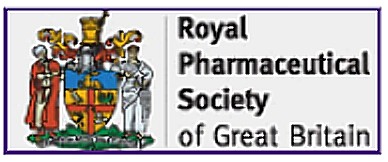
Ernst accused Boots of breaching ethical guidelines drawn up by the Royal Pharmaceutical Society of Great Britain, by failing to tell customers that its homeopathic medicines contain no active ingredients and are ineffective in clinical trials.
Another chain, Lloyds Pharmacy, are just as bad. Many smaller pharmacies are no more honest when it comes to selling medicines that are known to be ineffective.
Pharmacists are fond of referring to themselves as “professionals” who are regulated by a professional body, the Royal Pharmaceutical Society of Great Britain (RPSGB). It’s natural to ask where their regulatory body stands on the question of junk medicine. So I asked them, and this is what I found.
| 17 April, 2008
I am writing an article about the role of pharmacists in giving advice about (a) alternative medicines and (b) nutritional supplements. I can find no clear statements about these topics on the RPSGB web site. Please can you give me a statement on the position of the Royal Pharmaceutical Society on these two topics. In particular, have you offered guidance to pharmacists about how to deal with the conflict of interest that arises when they can make money by selling something that they know to have no good evidence for efficacy? This question has had some publicity recently in connection with Boots’ promotion of CCoQ10 to give you “energy”, and only yesterday when the bad effects of some nutritional supplements were in the news. |
Here are some extracts from the first reply that I got from the RPSGB’s Legal and Ethical Advisory Service (emphasis is mine).
| 28 April 2008
Pharmacists must comply with the Code of Ethics and its supporting documents. Principle 5 of the Code of Ethics requires pharmacists to develop their professional knowledge and competence whilst Principle 6 requires pharmacists to be honest and trustworthy. The Code states: 5. DEVELOP YOUR PROFESSIONAL KNOWLEDGE AND COMPETENCE At all stages of your professional working life you must ensure that your knowledge, skills and performance are of a high quality, up to date and relevant to your field of practice. You must: 5.1 Maintain and improve the quality of your work by keeping your knowledge and skills up to date, evidence-based and relevant to your role and responsibilities. 5.2 Apply your knowledge and skills appropriately to your professional responsibilities. 5.3 Recognise the limits of your professional competence; practise only in those areas in which you are competent to do so and refer to others where necessary. 5.4 Undertake and maintain up-to-date evidence of continuing professional development relevant to your field of practice. 6. BE HONEST AND TRUSTWORTHY Patients, colleagues and the public at large place their trust in you as a pharmacy professional. You must behave in a way that justifies this trust and maintains the reputation of your profession. You must: 6.2 Ensure you do not abuse your professional position or exploit the vulnerability or lack of knowledge of others. 6.3 Avoid conflicts of interest and declare any personal or professional interests to those who may be affected. Do not ask for or accept gifts, inducements, hospitality or referrals that may affect, or be perceived to affect, your professional judgement. 6.4 Be accurate and impartial when teaching others and when providing or publishing information to ensure that you do not mislead others or make claims that cannot be justified. |
And, on over-the counter prescribing
| In addition the “Professional Standards and Guidance for the Sale and Supply of Medicines” document which supports the Code of Ethics states:
“2. SUPPLY OF OVER THE COUNTER (OTC) MEDICINES STANDARDS When purchasing medicines from pharmacies patients expect to be provided with high quality, relevant information in a manner they can easily understand. You must ensure that: 2.1 procedures for sales of OTC medicines enable intervention and professional advice to be given whenever this can assist the safe and effective use of medicines. Pharmacy medicines must not be accessible to the public by self-selection. |
Evidence-based? Accurate and impartial? High quality information? Effective use?
These words don’t seem to accord with Boots’ mendacious advertisements for CoQ10 (which were condemned by the ASA).
Neither does it accord with the appalling advice that I got from a Boots pharmacist about Vitamin B for vitality.
Or their bad advice on childhood diarrhoea.
Or the unspeakable nonsense of the Boots (mis)-education web site.
Then we get to the nub. This is what I was told by the RPSGB about alternative medicine (the emphasis is mine).
| 8. COMPLEMENTARY THERAPIES AND MEDICINES
STANDARDS You must ensure that you are competent in any area in which you offer advice on treatment or medicines. If you sell or supply homoeopathic or herbal medicines, or other complementary therapies, you must: 8.1 assist patients in making informed decisions by providing them with necessary and relevant information. 8.2 ensure any stock is obtained from a reputable source. 8.3 recommend a remedy only where you can be satisfied of its safety and quality, taking into account the Medicines and Healthcare products Regulatory Agency registration schemes for homoeopathic and herbal remedies.” Therefore pharmacists are required to keep their knowledge and skills up to date and provide accurate and impartial information to ensure that you do not mislead others or make claims that cannot be justified. |
It does seem very odd that “accurate and impartial information” about homeopathic pills does not include mentioning that they contain no trace of the ingredient on the label. and have been shown in clinical trials to be ineffective. These rather important bits of information are missing from both advertisements and from (in my experience) the advice given by pharmacists in the shop.
If you look carefully, though, the wording is a bit sneaky. Referring to over-the-counter medicines, the code refers to “safe and effective use of medicines”, but when it comes to alternative medicines, all mention of ‘effectiveness’ has mysteriously vanished.
So I wrote again to get clarification.
| 29 April, 2008
Thanks for that information. I’d appreciate clarification of two matters in what you sent. (1) Apropros of complementary and alternative medicine, the code says 8.3 recommend a remedy only where you can be satisfied of its safety and quality I notice that this paragraph mentions safety and quality but does not mention efficacy. Does this mean that it is considered ethical to recommend a medicine when there is no evidence of its efficacy? Apparently it does. This gets to the heart of my question and I’d appreciate a clear answer. |
This enquiry was followed by a long silence. Despite several reminders by email and by telephone nothing happened until eventually got a phone call over a month later (May 3) from David Pruce, Director of Practice & Quality Improvement, Royal Pharmaceutical Society of Great Britain. The question may be simple, but the RPSGB evidently it hard, or more likely embarrassing, to answer.
When I asked Pruce why para 8.3 does not mention effectiveness, his reply, after some circumlocution, was as follows.
Pruce: “You must assist patients in making informed decisions by providing necessary and relevant information . . . we would apply this to any medicine, the pharmacist needs to help the patient assess the risks and benefits.”
DC: “and would that include saying it doesn’t work better than placebo?”
Pruce “if there is good evidence to show that it may, but it depends on what the evidence is, what the level of evidence is, and the pharmacist’s assessment of the evidence”
DC “What’s your assessment of the evidence?”
Pruce, “I don’t think my personal assessment is relevant. I wouldn’t want to be drawn on my personal assessment”. “If a pharmacist is selling homeopathic medicines they have to assist the patient in making informed decisions”
“I don’t think we specifically talk about the efficacy of any other medicine” [DC: not true, see para 2.1, above]
“We would expect pharmacists to be making sure that what they are providing to a patient is safe and efficacious”
DC “So why doesn’t it mention efficacious in para 8.3”
Pruce “What we are trying to do with the Code of Ethics is not go down to the nth degree of detail ” . . . “there are large areas of medicine where there is an absence of data”
DC “Yes, actually homeopathy isn’t one of them. It used to be.”
Pruce. “uh, that’s again a debatable point”
DC I don’t think it’s debatable at all, if you’ve read the literature
Pruce. “well many people would debate that point” “This [homeopathy] is a controversial area where opinions are divided on it”
DC “Not informed opinions”
Pruce “Well . . . there are also a large number of people that do believe in it. We haven’t come out with a categorical statement either way.”
I came away from this deeply unsatisfactory conversation with a strong impression that the RPSGB’s Director of Practice & Quality Improvement was either not familiar with the evidence, or had been told not to say anything about it, in the absence of any official statement about alternative medicine.
I do hope that the RPSGB does not really believe that “there are also a large number of people that do believe in it” constitutes any sort of evidence.
It is high time that the RPSGB followed its own code of ethics and required, as it does for over-the-counter sales, that accurate advice should be given about “the safe and effective use of medicines”.
“The scientist on the High Street”
The RPS publishes a series of factsheets for their “Scientist in the High Street” campaign. One of these “factsheets” concerns homeopathy, [download pdf from the RPSGB]. Perhaps we can get an answer there?
Well not much. For the most part the “factsheet” just mouths the vacuous gobbledygook of homeopaths. It does recover a bit towards the end, when it says
“The methodologically “best” trials showed no effect greater than that of placebo”.
But there is no hint that this means pharmacists should not be selling homeopathic pills to sick people..
That is perhaps not surprising, because the Science Committee of the RPSGB copped out of their responsibility by getting the factsheet written by a Glasgow veterinary homeopath, Steven Kayne. You can judge his critical attitude by a paper (Isbell & Kayne, 1997) which asks whether the idea that shaking a solution increases its potency. The paper is a masterpiece of prevarication, it quotes only homeopaths and fails to come to the obvious conclusion. And it is the same Steven Kayne who wrote in Health and Homeopathy (2001)
“Homeopathy is not very good for treating bacterial infections directly, apart from cystitis that often responds to a number of medicines, including Berberis or Cantharis”.
So there is a bacterial infection that can be cured by pills that contain no medicine? Is this dangerous nonsense what the RPSGB really believes?
More unreliable advice
While waiting for the train to Cardiff on April 16th (to give a seminar at the Welsh School of Pharmacy), I amused myself by dropping into the Boots store on Paddington station.
| DC I’ve seen your advertisements for CoQ10. Can you tell me more? Will they really make me more energetic?
Boots: Yes they will, but you may have to take them for several weeks. DC. Several weeks? Boots: yes the effect develops only slowly Peers at the label and reads it out to me DC I see. Can you tell me whether there have been any trials that show it works? Boots. I don’t know. I’d have to ask. But there must be or they wouldn’t be allowed to sell it. DC. Actually there are no trials, you know Boots. Really? I didn’t think that was allowed. But people have told me that they feel better after taking it. DC You are a pharmacist? Boots. Yes |
Sadly, this abysmal performance is only too typical in my experience, Try it yourself.
The malaria question
After it was revealed that pharmacists were recommending, or tolerating recommendations, of homeopathic treatment of malaria, the RPSGB did, at last. speak out. It was this episode that caused Quackometer to write his now famous piece on ‘The gentle art of homeopathic killing‘ (it shot to fame when the Society of Homeopaths tried to take legal action to ban it) Recommending pills that contain no medicine for the treatment or prevention or treatment of malaria is dangerous. If it is not criminal it ought to be [watch the Neals Yard video]. .
The RPSGB says it is investigating the role of pharmacists in the Newsnight sting (see the follow-up here). That was in July 2006, but they are stlll unwilling to say if any action will be taken. Anyone want to bet that it will be swept under the carpet?
The statement issued by the RPSGB, 5 months after the malaria sting is just about the only example that I can find of them speaking out against dangerous and fraudulent homeopathic practices. Even in this case, it is pretty mild and restricted narrowly to malaria prevention.
The RPSGB and the Quacktioner Royal
The RPSGB submitted a response to the ‘consultation’ held by the Prince’s Foundation for Integrated Health, about their Complementary Healthcare; a guide for patients.
| Response by the Royal Pharmaceutical Society of Great Britain Dr John Clements, Science Secretary “We believe that more emphasis should be given to the need for members of the public who are purchasing products (as opposed to services) to ask for advice about the product. Pharmacists are trained as experts on medicines and the public, when making purchases in pharmacies, would expect to seek advice from pharmacists” |
So plenty of puffery for the role of pharmacists. But there is not a word of criticism about the many barmy treatments that are included in the “Guide for Patients”. Not just homeopathy and herbalism, but also Craniosacral therapy, Laying on of Hands, chiropractic, Reiki, Shiatsu –every form of barminess under the sun drew no comment from the RPS.
I can’t see how a response like this is consistent with the RPS’s own code of ethics.
A recent president of the RPSGB was a homeopath
| Christine Glover provides perhaps the most dramatic reason of all for thinking thst, despite all the fine words, the RPSGB cares little for evidence and truth The NHS Blogdoctor published “Letter from an angry pharmacist”. | 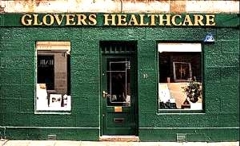 |
Mrs Glover was president of the RPSGB from 1999 to 2001, vice-president in 1997-98, and a member of the RPSGB Council until May 2005. She is not just a member, but a Fellow. (Oddly, her own web site says President from 1998 – 2001.)
So it is relevant to ask how the RPSGB’s own ex-president obeys their code of ethics. Here are some examples on how Ms Glover helps to assist the safe and effective use of medicines. . Much of her own web site seems to have vanished (I wonder why) so I’ll have to quote the “Letter from an angry pharmacist”., as revealed by NHS Blogdoctor,
“What has Christine got to offer?
- “We offer a wide range of Homeopathic remedies (over 3000 different remedies and potencies) as well as Bach flower remedies, Vitamins, Supplements, some herbal products and Essential Oils.”
- Jetlag Tablets highly recommended in ‘Wanderlust’ travel magazine. Suitable for all ages.
- Wind Remedy useful for wind particularly in babies. In can be supplied in powder form for very small babies. Granules or as liquid potency.
- Udder Care 100ml £80.00 One capful in sprayer filled with water. Two jets to be squirted on inner vulva twice daily for up to 4 days until clots reduced. Discard remainder. Same dose for high cell-counting cows detected.
Udder Care? Oh! I forgot to say, “Glover’s Integrated Healthcare” does cows as well as people. Dr Crippen would not suggest to a woman with sore breasts that she sprayed something on her inner vulva. But women are women and cows are cows and Dr Crippen is not an expert on bovine anatomy and physiology. But, were he a farmer, he would need some persuasion to spend £80.00 on 100 mls of a liquid to squirt on a cow’s vulva. Sorry, inner vulva.”
Nothing shows more clearly that the RPSGB will tolerate almost any quackery than the fact that they think Glover is an appropriate person to be president. Every item on the quotation above seems to me to be in flagrant breach of the RPSGB’s Code of Ethics. Just like the Society of Homeopaths, the code seems to be there merely for show, at least in the case of advice about junk medicine..
A greater role for pharmacists?
This problem has become more important now that the government proposes to give pharmacists a greater role in prescribing. Needless to say the RPSGB is gloating about their proposed new role. Other people are much less sure it is anything but a money–saving gimmick and crypto-privatisation.
I have known pharmacists who have a detailed knowledge of the actions of drugs, and I have met many more who haven’t. The main objection, though, is that pharmacists have a direct financial interest in their prescribing. Conflicts of interest are already rife in medicine, and we can’t afford them.
Conclusion
The Royal Pharmaceutical Society is desperately evasive about a matter that is central to their very existence, giving good advice to patients about which medicines work and which don’t. Pharmacists should be in the front line in education of the public, about medicines, the ‘scientist on the High Street’. Some of them are, but their professional organisation is letting them down badly.
Until such time as the RPSGB decides to take notice of evidence, and clears up some of the things described here, it is hard to see how they can earn the respect of pharmacists, or of anyone else.
Follow-up
Stavros Isaiadis’ blog, Burning Mind, has done a good piece on “More on Quack Medicine in High Street Shops“.
The Chemist and Druggist reports that the RPSGB is worried about the marketing of placebo pills (‘obecalp’ -geddit?). It does seem very odd that the RPSGB should condemn honest placebos, but be so very tolerant about dishonest placebos. You couldn’t make it up.
A complaint to the RPSGB is rejected
Just to see what happened, I made a complaint to thr RPSGB about branches of their own Code of Ethics at Boots in Hexham and in Evesham. Both of them supported Homeopathy Awareness Week These events had been publicised in those particularly unpleasent local ‘newspapers’ that carry paid advertising disguised as editorial material. In this case it was the Evesham Journal and the Hexham Courant.
Guess what? The RPSGB replied thus
“Your complaint has been reviewed bt Mrs Jill Williams and Mr David Slater who are both Regional Lead Inspectors. Having carried out a review they have concluded that support of homeopathic awareness week does not constitute a breach of the Society’s Code of Ethics or Professional Standards.”
In case you have forgotten, the Professional Standards say
2.1 procedures for sales of OTC medicines enable intervention and professional advice to be given whenever this can assist the safe and effective use of medicines.
The RPSGB has some very quaint ideas on how to interpret their own code of ethics
The extent to which irrationality has become established in US Medicine is truly alarming I wrote about Quackademics in the USA and Canada on my last trip to the USA, and on my May trip I visited Yale, where I decided to try a full frontal attack. [download the poster]

Several US blogs have written about this phenomenon. For example the incomparable Orac at the The Academic Woo Aggregator , and Dr RW (R.W. Donnell) , see particularly his articles on How did pseudoscience get admitted to medical school? and What is happening to our medical schools? Abraham Flexner is turning over in his grave. Excellent US stuff too at Science-based Medicine (try this and this). There is also a good analysis of what’s happening at Yale by Sandy Szwarc at Junkfood Science.
Remember that the terms ‘integrative’ and ‘complementary’ are euphemisms coined by quacks to make their wares sound more respectable, There is no point integrating treatments that don’t work with treatments that do work.
‘Integrative Medicine’ at Yale says, like all the others on the roll of shame, says “we aim to improve awareness and access to the best in evidence-based, comprehensive medical care available worldwide”. They all pay lip service to being “evidence based”, but there is just one snag. It is untrue. In almost all cases, the evidence is either negative or absent. But this does not put them off for a moment. The whole process is simply dishonest.
The evidence
The evidence has been summarised in several books recently, The following books are particularly interesting because they are all ‘views from the inside. Edzard Ernst is the UK’s first Professor of Complementary Medicine. Barker Bausell was research director of an NIH funded Complementary and Alternative Medicine Specialized Research Center at the University of Maryland.
The first two books go through the evidence fairly and carefully. They show no bias against alternative treatments (if anything, I’d say they are rather generous in cases of doubt).
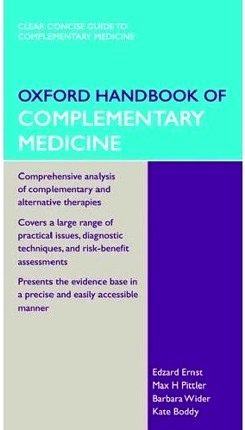 |
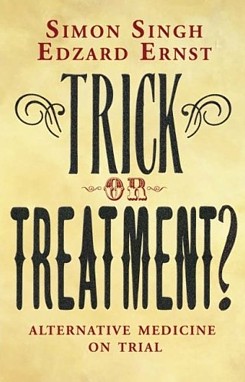 |
For a first class US account try Barker Bausell’s Snake Oil Science
Bausell’s book gives an excellent account of how to test treatments properly, and of all the ways you can be fooled into thinking something works when it doesn’t. Bausell concludes
|
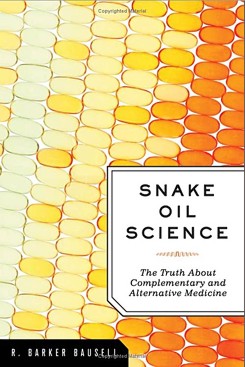 |
| For an excellent account of how to find the truth, try Testing Treatments (Evans. Thornton and Chalmers). One of the authors, Iain Chalmers, is a founder of the Cochrane library and a world authotity on how to separate medical fact from medical myth. | 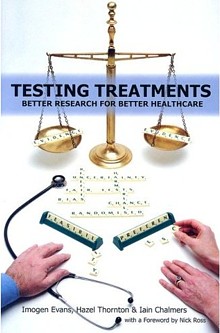 |
It can now be said with some certainty that the number of alternative treatments that have been shown to work better than placebo is very small, and quite possibly zero,
With that settled, what’s going on at Yale (and many others on the roll of shame)?
David L. Katz, MD, MPH, FACPM, FACP, is founder and director of the Integrative Medicine Center (IMC) at Griffin Hospital in Derby, Connecticut. He is also an associate professor, adjunct, of Public Health and director of the Prevention Research Center (PRC) at the Yale University School of Medicine in New Haven, Connecticut.
That sounds pretty respectable. But he is into not just good nutrition, exercise, relaxation and massage, but also utterly barmy and disproved things like homeopathy and ‘therapeutic touch’.
| Watch the movie
It so happens that Yale recently held an “Integrative Medicine Scientific Symposium”. Can we find the much vaunted evidence base there? That is easy to answer because three hours of this symposium have appeared on YouTube. So this is the public face of Yale medical school. There’s some interesting history and a great deal of bunkum and double-speak. To save you time, I’ve cut out about 6 minutes from the movies. |
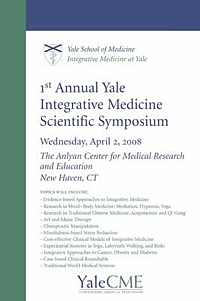 |
View or download the movie here > [18.5 Mb, flv file].
Dean of education Richard Belitsky and Dr David Katz
Pretty remarble uh? Dr Katz goes through several different trials, all of which come out negative. And what is his conclusion? You guessed.
His conclusion is not that the treatments don’t work but that we need a “more fluid concept of evidence” .
It’s equally bizarre to hear Richard Belitsky, Dean of Medical Education at Yale saying he is “very proud” of this betrayal of enlightenment values. If this is what Yale now considers to be education, it might be better to go somewhere else.
This is not science. It isn’t even common sense. It is a retreat to the dark ages of medicine when a physician felt free to guess the answer. In fact it’s worse. In the old days there was no evidence to assess. Now there is a fair amount of evidence, but Dr Katz feels free to ignore it and guess anyway. He refers to teaching about evidence as ‘indoctrination’, a pretty graphic illustration of his deeply anti-scientific approach to knowledge. And he makes a joke about having diverted a $1m grant from CDC, for much needed systematic reviews, into something that fits his aims better.
Katz asks, as one must, what should we do if there is no treatment that is known to help a patient. That is only too frequent a problem. The reasonable thing to say is “there is no treatment that is known to help”. But Dr Katz thinks it’s better to guess an answer. There is nothing wrong with placebo effects but there is everything wrong with trying to pretend that you are doing more than give placebos. Perhaps he should consider the dilemmas of alternative medicine.
You can read about more about Yale’s activities here and in interviews here. Dr Katz says “The founding approach—and I think Andrew Weil, MD, gets the lion’s share of credit for establishing the concept —is training conventional practitioners in complementary disciplines”. Let’s take a look at this hero. Try, for example, Arnold Relman’s “A trip to Stonesville“.
“According to Weil, many of his basic insights about the causes of disease and the nature of healing come from what he calls “stoned thinking,” that is, thoughts experienced while under the influence of psychedelic agents or during other states of “altered consciousness” induced by trances, ritual, magic, hypnosis, meditation, and the like.”
“To the best of my knowledge, Weil himself has published nothing in the peer-reviewed medical literature to document objectively his personal experiences with allegedly cured patients or to verify his claims for the effectiveness of any of the unorthodox remedies he uses.”
Here is the advertisment for Andrew Weil’s nutrition symposium.

Not only does this yet again propagate the great antioxidant myth, but a few moments with Google show that it is riddled with vested interests, as already pointed out on Quackademics in USA and Canada.
What has brought medical schools down to this level?
That isn’t hard to see, The main thing is simply money. Very few university administrators have the intellectual integrity to turn down money, whatever the level of dishonesty that is required by its acceptance. You can buy a lot of silence for $100m
The US Taxpayer has given almost a billion dollars, via NIH.
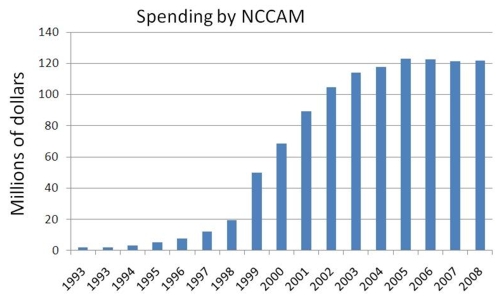
Wallace Sampson, MD says of NCCAM
“. . it has not proved effectiveness for any ‘alternative’ method. It has added evidence of ineffectiveness of some methods that we knew did not work before NCCAM was formed”
“Its major accomplishment has been to ensure the positions of medical school faculty who might become otherwise employed in more productive pursuits.”
“Special commercial interests and irrational, wishful thinking created NCCAM. It is the only entity in the NIH devoted to an ideological approach to health.”
NCCAM has given money from some very dubious trials too, Both Orac on Respectful Insolence and Dr RW (R.W. Donnell) have written recently about the NCCAM-funded trial of “chelation therapy”, as first exposed in a devastating article by Kimball C. Atwood IV, MD; Elizabeth Woeckner, AB, MA; Robert S. Baratz, MD, DDS, PhD; Wallace I. Sampson, MD on Medscape Today. This is a $30 million, 5-year, phase 3 Trial to Assess Chelation Therapy (TACT) for coronary artery disease.
“But how did such a crappy study ever come to be, much less be funded by the NIH to the tune of $30 million? The answer, not surprisingly, involves one of the foremost promoters of quackery in the federal government, Representative Dan Burton (R-IN).”
“We conclude that the TACT is unethical, dangerous, pointless, and wasteful. It should be abandoned.”
Orac comments
“TACT is not the only example of an unethical and scientifically worthless trial being funded not because the science is compelling but because powerful lobbies and legislators who are true believers in woo applied pressure to the NIH to do them”
The Bravewell Collaboration is the other major source of money. Forbes Business says “Bravewell is not some flaky New Age group”. Well dead wrong there, That is precisely what it is.
This group of ultra-rich people, according to its boss, Christy Mack, has a
So Bravewell is corrupting the search for real knowledge and real cures with big bucks. You can buy a lot of hokum for $100m. |
 |
The money comes from Morgan Stanley,
|
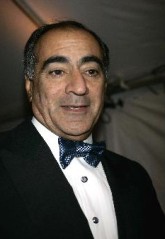 |
Bravewell is run by his wife, Christy Mack (Mack-the-wife?) Vice-President, The C.J. Mack Foundation, Member, Board of Directors, The Bravewell Collaborative.
The Flexner report.
The story of Bravewell stands in chilling contrast to another case of philanthropy. Andrew Carnegie’s foundation financed the report by Abraham Flexner, “Medical Education in the United States and Canada” (1910) [download, 15 Mb] . That report was responsible for dragging medical education out of the dark ages
almost a century ago. It resulted in creation of some of the best medical schools anywhere (including Yale).
“By educational patriotism I mean this: a university has a mission greater than the formation of a large student body or the attainment of institutional completeness, namely, the duty of loyalty to the standards of common honesty, of intellectual sincerity, of scientific accuracy.”
“The tendency to build a system out of a few partially apprehended facts, deductive inference filling in the rest, has not indeed been limited to medicine, but it has nowhere else had more calamitous consequences.”
Flexner (1910).
Now another philanthropist is using big bucks to reverse the process and push medicine back into the 19th century.
Flexner would have thought it quite inconceivable that in 2007 medical schools would be offering Continuing Medical Education in homeopathy.
Why are Yale’s academics so quiet about this?
Perhaps they don’t even know it’s happening. If they say firmly that they don’t want it, it will go,
It’s been done before
Florida State University, allegedly under political pressure, proposed to set up a school of Chiropractic. That would have made it Florida State school of snake-oil salesmanship. What a sad fate. [ Science magazine comment] [comment form Paul Lee] [Comment in St Petersburg Times]
But the academics stopped it. An FSU professor, Albert Stiegman, predicted the future campus map.
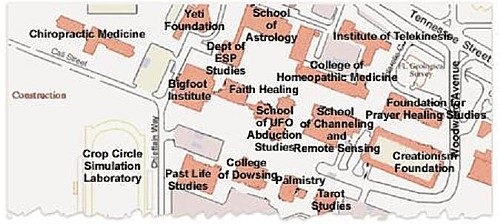
According to FSUnews
“The Florida Board of Governors voted 10-3 Thursday to deny Florida State University’s request to build a chiropractic school.”
“However, the passage of the bill for the chiropractic school by the Legislature seemingly bypassed the Board of Governors.”
In the end, reason won. Let’s hope that Yale follows their example.
Follow up
The problem of Yale has been taken up with great eloquence by some US commentators
Dr RW (R.W, Donnell): “Quackademic Medicine at Yale”
“By the way, where’s the AAMC in all this? Aren’t they supposed to be guardians of integrity and professionalism in medical education? Are they asleep at the switch or is money silencing them too?”
Orac (Respectful Insolence): “Integrative” medicine at Yale: A more “fluid” concept of evidence?”
“after the Dean of the Yale School Medicine embarrassed himself in the introduction by saying he’s proud of how far this nonsense has come, Dr. Katz takes the stage and demonstrates the sort of hostile attitude towards science that, if allowed to take root will be the death of scientific medicine in any meaningful form at U.S. medical schools”
Junkfood Science. Sandy Szwarc on “Quote of the day: ;We need a more fluid concept of evidence’”
“Will healthcare professionals and consumers . . . . speak out against these wellness programs being enacted by government agencies, insurers and employers? Or is the money too good?”
Science-based Medicine. Steven Novella writes on “Changing the rules of evidence“. When alternative medicine people do not like the evidence, they change the rules to get the outcome that they want, as seen so graphically in this post. They have always done this, but it is only recently that this sort of behaviour has been endorsed by places like Yale.
The Macho Response, another US blog, comments bluntly, in “Yale wants a more fluid concept of evidence”
This is beyond embarrassing – it’s a fucking crime – and it’s happening at Yale University and many others.
If you’re in the medical profession (and I know many of my readers are) you need to go here – now.
Kiosque Médias writes as follows
Pour ceux qui s’intéressent à la médecine et à la santé, le blog de David Colquhoun vaut probablement le détour. Ce professeur-chercheur au département de neurosciences, de physiologie et de pharmacologie de l’University College London y décrypte les résultats d’études médicales, en mettant l’accent sur les médecines alternatives. Et il est rarement tendre!
James Randi Newsletter. The hit rate soars after a recommendation this piece by the amazing Randi.
Hokum-Balderdash Assay. Edwardson writes
“Yale University is going to the ducks. It now has an Integrative Medicine program and in April held its first annual Integrative Medicine Scientific Symposium. I think there must’ve been a typo there. They must’ve meant “Ist Annual I.M. Pseudoscientific Symposium.” There! Now we’ve done away with the oxymoron.”
Why is Yale so secretive about its quackery department?,
Most universities are only to keen to boast about their grant income. Not in this case though. When I asked how they funded their quackery, all I got was a letter that had very obviously been drafted by a lawyer.
“As a private institution, Yale University is not generally subject to the U.S. Freedom of Information Act. We therefore respectfully decline to compile and provide the information you have requested.”
So pretty clear signs of guiltiness there.
Dr David Katz, yes, he of the “fluid concept of evidence”, has posted an article, Health Hazards of rhe Blogoshere. If it quacks like a duck . . .
It seems that he has been a bit alarmed by the reaction of the bloggers. It starts, rather pompously, thus.
“Being well educated does not guarantee you’ll always be right, and it certainly doesn’t guarantee everyone will agree with you. But it still matters. Or at least it used to “
But the rest if it reads less like a defence than as an admission of guilt, thus prompting the next item.
Paul Hutchinson’s blog
| A quack who admits it picks out a quotation from Dr Katz’s response and turned into a cartoon, released to the public domain, So here it is. | 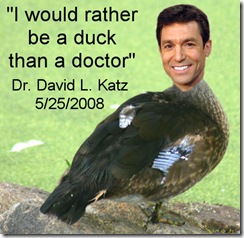 |
Respectful Insolence.
Orac comments too, in “Fluid evidence” strikes back: Dr. Katz versus the skeptical blogsophere”. He does a terrific job in taking apart the response from the hapless Dr Katz.
“No, Dr. Katz does not like his first encounter with the medical blogosphere at all. Indeed, he is so unhappy that apparently a few weeks ago he tried t answer the bloggers who had raked him over the coals for blatantly advocating “integrating” unscientific woo like homeopathy with scientific medicine. Unfortunately for him, he did not do a particularly good job of it. Indeed, what most stood out as I read his rejoinder was that he does not answer a single substantive criticism leveled at his comments. Not one. Instead, he does what pretty much all woo-meisters do when criticized for shifting goalposts and appealing to other ways of knowing besides science as a means of “proving” that their preferred fairy dust works; he wraps himself in the mantle of the brave iconoclast willing to challenge accepted dogma and whines about the peons who criticized him, heaping contempt on the bloggers who had the temerity to criticize his advocacy for pseudoscience because to him they have not earned the right to criticize his (at least in his opinion, apparently) greatness in comparison to him.”
In a wonderful demonstration of common sense, the BBC has removed all the alternative medicine pages from BBC Health web site. I expect that it was helped in making that decision by the many complaints it had received about statements on these pages that were simply not true, The existence of these pages was just not compatible with the BBC’s commitment to accuracy.
| Needless to say, this decision was greeted with howls of rage from the alternative world. Some wrote to the BBC to complain (and I wrote to congratulate them). Until today I haven’t been able to find any BBC statement on the matter. This one appeared on Healthypages, one of the zaniest sites on the net. Nothing is too barmy for them. This is the picture they used to show how wrong the BBC is | 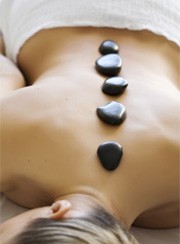 Picture from Healthypages |
“I do a range of spiritual healing practices and can offer an energetic healing session including techniques from the Order of Melchizedek and about 10 forms of Reiki in exchange for a Theta Healing session.”
And just in case you don’t know about the Melchidezek method, here is a picture of a poster in the window of my local “health food” shop.

The explanation says
“Using ancient holographic technology, the basis of the techniques presented is the activation of the Merkaba, a rotating lightfield awakening your spherical consciousness. This raises one’s quotient of light vibration within the human atomic cell structure. Once activated. the merkaba assists us in accessing our naturally ascended consciousness state: the healing capabilities are enhanced a hundred-fold. The Hologram of Love has the ability to heal and rejuvenate any form of creation as it is the living conscious holographic pattern of God Source vibration.”
There, and I’ll bet you thought holography was a recent invention. As an example of sciencey-sounding words used in random order, this one takes a bit of beating. It really is an insult to human intellect.
Anyway, back to the BBC. This is their diplomatic response (what they should have said really was, ‘those pages were nonsense so we removed them’).
BBC issued the following statement, dated 22 Feb 2008:
| Complaint We received complaints about the Complementary section of the BBC Health website being disbanded The BBC’s response The decision to remove the complementary medicine area of the health website was taken as part of a wider review of all the health content in order to enable the BBC to focus its efforts on creating new and exciting content. In order to release resources for this redevelopment work, we’re reviewing existing content from an editorial and value-for-money perspective.The complementary health section was incomplete and, therefore, not of a satisfactory editorial standard. It also represented a small proportion of traffic to the site but was disproportionately time-consuming.Therefore, the decision to take it down was based on a combination of factors: how much work it needed to maintain to a high editorial standard, how much this cost and how popular it was with site users.We have already removed other sections of the health site and plan to reduce or remove others. We appreciate people are disappointed this area of the site has been removed and apologise if the decision has appeared abrupt to site users or inconvenienced other sites linking to BBC Health. The BBC will continue to cover complementary health in other areas of its output, such as TV, radio and news programmes, and may reassess its complementary health content in future. |
” . . . However the site has in recent months been targetted by the self-appointed ‘quackbusters’ ( . . . such as David Colquhoun), who sent a deluge of letters and emails claiming that complementary therapies such as homeopathy and cranial osteopathy were ‘unscientific’ and should be removed.”
Well thanks for the credit, but sorry, there was no deluge. I wrote no more than a couple of times myself, and I suspect that a handful of friends did the same. I didn’t even ask them to remove the whole lot, merely to correct particular statements that were not true,
‘Mardi’ goes on
“Rather than taking a reasoned view and considering the evidence from good research studies on complementary medicine, these individuals seem simply hell bent on trying to stamp out complementary medicine”
That really is a bit rich. Suddenly the alternative industry are invoking evidence from good research studies. It is precisely the other way round. It is because that evidence is almost all negative that the BBC have decided to remove their coverage.
Of course it may have helped that the BBC had to spend a lot of time defending itself against criticism of the BBC 2 TV series on Alternative Medicine from February 2006. After initially rejecting complaints, an appeal to the highest level, the Board of Trustees, two of the most serious complaints were upheld against these programmes.
Boots the Chemists have proved themselves dishonest before, over their promotion of homeopathy and of B Vitamins “for vitality”
In a press release dated 12 March 2008, they have hit a new low in ethical standards
| Boots help boost the nation’s energy levels in just one week “Health and beauty expert Boots has launched an exclusive energising vitamin supplement that helps boost depleted energy levels and maintain vitality. It is the first time that this exclusive form of CoQ10 has been made available on the high street.” ” . . .supplementation can help to supply higher levels of CoQ10 than are available in the diet. Boots Energy Super Strength CoQ10 containing natural Kaneka CoQ10 is a way of boosting energy levels that can help people who lack energy to see results in a week” |
You decide.
Last year there was an equally misleading press release about CoQ10 from Solgar/Boots Herbal. That one was headed “Need More Energy – Solgar’s Nutri Nano™ Uses Nanotechnology to Deliver Unprecedented Bioavailability of CoQ10”. Not only is the word ‘energy’ misused but notice that the trendy term ‘nanotechnology’ is worked in for extra sciencey effect. It turns out that all this means is that the preparation contains micelles. So nothing new there either. Micelles have been known for almost 100 years.
In contrast, the Boots online store is noticeably more restrained. Could that be because the Advertising Standards People can’t touch press releases, just as they can’t control what Boots Expert Team tell you face to face in the shop?
Boots PR contact is given as: Carrie Eames, PR Manager, Boots The Chemists, D90W WG14, Thane Road, Nottingham NG90 1BS. I’m not sure how Ms Eames sleeps at night. Perhaps you should write to her and let her know what you think.
You might point out to her Boots (anti) Social Corporate (ir)Responsibility Page. It says
| “So it’s part of our heritage to treat our customers fairly and act with integrity in everything we do, rather than seizing on the quickest and easiest way to turn a profit.” |
CoQ10 and “energy”
Coenzyme Q10 (also known as ubiquinone) is a relatively small molecule. It cooperates with cytochrome enzymes (big proteins) to synthesize a molecule called ATP. This is a chemical form of energy that can be used to do work, such as making a muscle fibre contract.
The word “energy ” here is used in the sense that a physicist would use it. It is measured in joules or in calories. The meaning of the word ‘energy‘ is described nicely in the Wikipedia entry. For example, when an electric current passes through a resistor (like a kettle) the electrical energy is converted to heat energy, and the energy used is potential difference (volts) X current (amps) X time. In other words energy is power (in watts) times time. So another unit for energy is kilowatt-hours (one kilowatt-hour is about 3.6 megajoules).
Energy in this sense has nothing whatsoever to do with the everyday use of ‘energy’ to indicate your vitality, or how lively you feel.
Furthermore there is not the slightest empirical reason to think that CoQ10 makes you feel more lively. None. The press release cites a sciencey-sounding reference (Ernster L, Dallner G. Biochemical, physiological and medical aspects of ubiquinone function. Biochim Biophys Acta. 1995 May 24;1271(1):195-204.). But this paper is just a review of the biochemistry, nothing whatsoever to do with feeling good.
CoQ10 and the supplement business
There is nothing new in this big push by Boots. CoQ10 has been a staple of supplement business for a long time now. All sorts of medical claims have been made for it. Everything from migraine, to Parkinson’s disease to cancer has been raised as possible benefits of the magic drug, oops, I mean ‘supplement’. This is quite improper of course, since it is being sold as a food not as a medicine, but it is standard practice among supplement hucksters, and so far they have been allowed to get away with it.
What’s interesting though is that until Boots PR machine swung into action, one thing that hadn’t been claimed much is that it made you feel more lively. That’s one they just invented.
CoQ10 and the press
It’s standard technique to get free advertising by hoping that journalists will dash off an article on the basis of a press release, with the hope that they will be in too much hurry to check the spin. Too often it works.
The Daily Mail has big coverage of the press release, under the title “Can a 60p pill from the chemist really add years to your life?“. This was written by Anna Hodgekiss and it’s not bad. It starts with a nice note of scepticism
“Forget vitamins C, E or even B12. The real wonder supplement is Coenzyme Q10 or CoQ10. That’s what Boots would have you believe, anyway. ”
“So should we all be taking this supplement?Not according to David Colquhoun, professor of pharmacology at University College London, who says Boots’ claims are “deliberately misleading customers”.
“Yes, CoQ10 helps the body convert glucose into energy, but it’s not the psychological get-up-and-go energy you feel day to day.
“The type of energy it does produce powers our muscles and cells – physical energy. They have confused the two here to promote a product that I’m not convinced would make any difference to how you actually feel at all.”
The article goes on
Among the other sceptics is Scott Marsden, a senior dietician at The London Clinic.
“There haven’t been enough trials to warrant us all taking CoQ10,” he says.
“It sounds boring, but if you are healthy and eating a balanced diet, you will get all the nutrients you need and shouldn’t have to take supplements.
“Not only could you be spending money unnecessarily, you could also be putting your health at risk. Buy some wholesome food instead.” “
Dr Clare Gerada, vice chairman of the Royal College of General Practitioners, is more forthright.
“While there is some evidence to suggest CoQ10 supplements may help patients with heart failure or severe respiratory disorders, more work is needed,” she says.
“This is just another example of normal health being medicalised, and it’s an issue that worries me.
“The human body is an amazing machine, and we have never been in better health. The fact that more people are living well into their 80s and 90s is proof.
“People need to stop looking for a wonder pill in their quest to live for ever.”
But guess who comes out fighting for Boots? None other than my old friend Dr Ann Walker. Little wonder then that my Nutriprofile result recommended a co Q10 supplement, because she is involved in that too.
Ann Walker’s colleague on the Nutriprofile project, Dr Sarah Brewer comments on CoQ10 on the Healthspan site, thus.
“As CoQ10 is vital for energy production in muscle cells, lack of CoQ10 is linked with lack of energy, physical fatigues, muscle aches and pains . . .”
It seems that she also can’t distinguish between energy in joules and energy as vitality,
Female First and Marie Claire also carry a story “Boots Sell ‘Life Extending’ Pill”
“A new pill that claims to add years to our lives is due to hit shelves in Boots stores this week but scientists say the drug is misleading.”
“Despite these claims Professor David Colquhoun told Marie Clare that he believes the drug is ‘deliberately misleading customers’: “Yes, CoQ10 helps the body convert glucose into energy, but it’s not the psychological get-up-and-go energy you feel day to day,” he said.”
(Funny, I never consciously spoke to Marie Claire but the quotation is OK.)
The Times, in contrast, carries an appalling column by their Dr Thomas Stuttaford, “A natural solution to tiredness“. There isn’t even a question mark in the title, and the content is totally uncritical. Private Eye has nicknamed the author ‘Dr Thomas Utterfraud’. How very cruel.
See also, excellent articles on CoQ10 by Ben Goldacre in the Guardian, and at badscience.net, and at Holfordwatch and Dr Aust’s Spleen
Aha Boots have repeated their mendacious claims in newspaper advertisements
This appeared in the Guardian on 18 March, and I’m told it was in the Mail too.

The small print says
“The new Boots Energy supplement contains Kaneka Q10 to help boost your energy levels throughout the day”
Here is what I just sent to the Advertising Standard Authority, or email new.complaints@asa.org.uk . Why not have a go yourself?
| “The words “boost your energy levels” and “still lacking energy” constitute a (presumably deliberate) confusion beteen ‘energy’ measured in joules and the everyday use of the word ‘energy’ to mean vitality. The former usage would be justified in viewof the role of Coenzyme Q10 in ATP production. There is neither theoretical justification nor any empirical evidence that CoQ10 helps your vitality or ‘energy’ in the latter sense.” |
A full size graphic to attach to your complaint can be downloaded here.
We are all interested in the relationship between our health and what we eat. What a pity that so little is known about it.

The problem, of course, is that it almost impossible to do randomised experiments, and quite impossible in most cases to make the experiments blind. Without randomisation there is no way to be sure about causality, and causality is all that matters. All you can do is measure “associations” and that sort of information is simply unreliable.
For example, if you simply observe that people who eat a lot of dark green vegetables are healthier than those who don’t, there is no reliable way to tell whether their health is caused by eating the vegetables. It is just as likely that, for example, rich people are healthier because the are rich, not because they eat more vegetables. The answer, though usually not known, is the only thing that matters for offering advice. The crucial problem is that, in the latter case, it will do no good at all to bully a poor person to eat more vegetables: their health will not improve because their bad health was caused by poverty, not by lack of vegetables.
It is precisely this difficulty that results in the constantly conflicting advice that we are given about diet. I can’t think of any single thing that does more harm to real science than the fact that one week we are told that red wine is bad and the next week we are told that red wine is good. No doubt both statements were based on a naive observational studies, the significance of which is vastly exaggerated by its authors (and often by their university’s media department too).
The first job of a scientist is to be able to say “I don’t know”. Under pressure from the government’s audit culture, and the HR apparatchiks who embrace it so eagerly, all that is forgotten only too easily. he lack of certain answers about diet leaves a vacuum into which not only naive scientists are sucked, but also it is a gift for hucksters who are eager to sell you expensive ‘supplements’, whether or not you need them. As always, it is a case of caveat emptor.
The questions are important to us all, so when sciencepunk pointed out to me a chance to check my own diet, I went for it. I try to keep pretty close to the current guidelines. Unreliable though they may be, they are the best we’ve got. So I went to the Nutriprofile site, and filled in the questionnaire, quite honestly (apart from saying I was 37 -I wish).
I eat plenty of fruit and oily fish every week so I though I’d do quite well. No such luck. I ended up being told I was deficient in iron and selenium, and at “risk of deficiency” in vitamin B5 (pantothenic acid), folate, vitamins D, E, K, magnesium, copper and potassium.
Uhuh, I must really be ill and I’d never realised it.
At the bottom of this analysis of all my deficiencies comes the sales pitch, “your personalised supplement recommendations”.”Strongly recommended” for me is Gold Standard A-Z Multivitamins (just click on the “buy now” button). I’m also “recommended” to buy Omega 3 1000mg capsules.
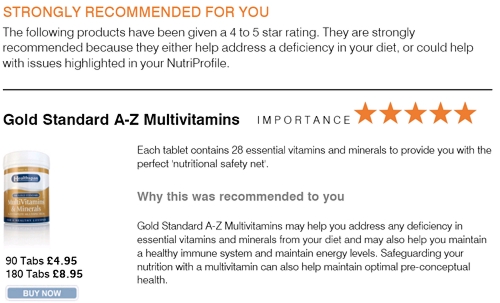
And then I’m invited to consider a whole list of other supplements
“The following products have been given a 1 star rating. This usually means they have been recommended to meet a specific issue raised by your NutriProfile. You should consider these supplements where you feel they could help if the issue is particularly important to you”
Here is the list.
- Selenium + A,C,E,
- Echinacea (“may help you maintain a healthy immune system”).
- OptiFive (antioxidant supplement)
- Co-enzyme Q10 (“may help you maintain energy levels” -look out for a forthcoming post on this scam)
- Memo Plus (“may help you maintain brain health and cognitive function”),
- Panax Ginseng (“may help you to maintain energy levels”
- Psyllium Husks
- Magnesium
- Vitamin D
- Ginkgo Biloba
- Probiotic
As always, there are lots of fantasies about “strengthening the immune system”. And the great antioxidant myth is exploited to the full.
Puzzled by this result, I got my wife to do the questionnaire, and also a particularly healthy and diet conscious colleague.
My wife was recommended to buy Omega 3 1000mg, Osteo Plus Bone health supplement (despite telling them that she already took calcium) and 50 Plus Multivitamins (“may help you address any deficiency in essential vitamins and minerals and may also help you maintain a healthy immune system and maintain energy levels. “). And then it may not.
My spectacularly healthy and diet conscious colleague got a strongly recommended (maximum 5 stars like me) for Gold Standard A-Z Multivitamins and for Omega 3 1000mg, as well as “recommended” for plant sterols, garlic and Opti-Omega 3.
Either I’m a lot unhealthier than I thought, or Nutriprofile is a sales scam.
You decide.
Is there anyone at all who does NOT need supplements?
By this stage I was getting suspicious so I sent the link to a professional dietitian, Catherine Collins of St George’s Hospital London. Unlike the people running the site, she has no financial interest in selling you pills. I asked her to fill in the questionnaire as a hypothetical person who had an ideal diet, based on current nutritional knowledge . Surely such a paragon of dietetic virtue would not need to buy pills too?
Don’t you believe it. At least she didn’t get any 5 star “strongly recommended”, but she did get “Recommended for you” Opti-Omega 3 (3.5 stars) and Gold Standard A-Z Multivitamins (3 stars). Plus, of course the whole list of “you may like to consider”, same as everyone seems to get.
So I asked Collins how it came about that everyone seems to end up being recommended to buy pills after going through all the questions. Here is what she said.
“Apparently my ratio of omega3:6 is unbalanced. not if you ate the amount of oily fish i’d put in, and used ‘vegetable’ oil which is mono-rich rapeseed. I think they’ve used the sunflower analysis to generate this distortion.
I disagree with absolute amounts of omega-3 per day. The amount I recorded meant I would easily exceed a daily intake of 500 mg of the important omega-3 fats, EPA and DHA
Low Vitamin B6 and folate – totally incorrect recommendation based on my entries
Potassium – the survey indicated concern that diet provided 200mg per day less potassium than recommended. This was incorrect, the flaw I assume being due to inability of the questionnaire to handle portion sizes. Should I have been worried even if this had been accurate? Of course not. Potassium is widespread across food groups, the most concentrated being fruit and vegetables. It is an essential nutrient, but its requirements are relative to sodium (‘salt’) intake.
Their omega-3 fat recommendation is double the FSA/ SACN suggestion of 450mg/d – they actually quote this in their supporting information but then say ‘experts say we need double’ [their experts are below]. This is highly misleading. We need a combination of omega-3 fats in our diet for health – not only the ‘fishy’ EPA and DHA, but also the readily available ALA, found in vegetable (rapeseed) oil
Omega 3:6 ratio -completely wrong based on the foods entered. Demonstrates a major flaws in the assumptions made about type and amount of foods in the diet.
Water recommendations. Totally inaccurate information based on the myth expounded by the health food industry and its workers that caffeine is a diuretic. This been extensively researched and proven to be not true ( Grandjeans excellent work). The only way in which a caffeinated beverage is ‘diuretic’ to someone who takes caffeinated drinks regularly is in the volume of drink consumed.
She concludes
“”This appears an elaborate pill-pushing exercise. Superficially reassuring in promoting the recognised FSA (Food Standards Agency] line – but then giving undue – and unjustifiable – support to the anecdotal ‘experts recommend’ to create what will be a powerful sell”
The comment about water intake stems from this bit of Collins’ Nutriprofile:
“Caffeinated drinks, fizzy drinks and alcohol do not count because, whilst they contain water, they are mild diuretics, ie. they boost urine output and therefore should only form a small part of your total fluid intake.”
This myth (aka nutribollocks) is quite contrary to what the real research (going back to 1928) says, Check “Laying the caffeine myth to rest” for the real story..
I’m told that Healthspan are now sending out the paper questionnaire in newspapers. Presumably this is to ensure that the poor, the elderly etc and others who that aren’t computer literate don’t miss their buying opportunity. How considerate of them.
Nutriprofile’s expert team
Who is the expert team behind Nutriprofile? Here they are.
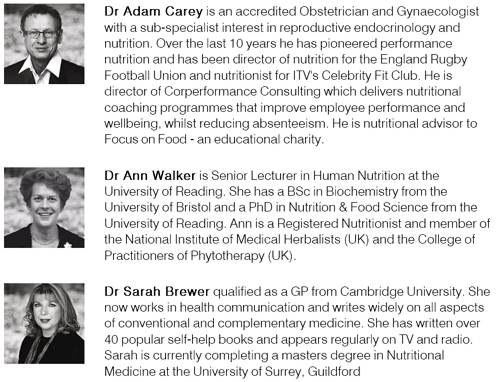
 |
 |
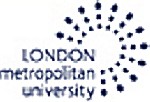 |
What do the real experts say about supplements?
The story you get is quite different when you ask somebody who is not trying to sell you something
The Food Standards Agency says
“Most people should be able to get all the nutrients they need by eating a varied and balanced diet. But if you choose to take supplements, it’s important to know that taking too much or taking them for too long can cause harmful effects.”
Harvard Men’s Health Watch says
“Harvard Men’s Health Watch suggests that the average man give up the multivitamin, at least until scientists solve the puzzle of folic acid and cancer.”
“If you eat a balanced diet that includes food from all the major groups, there should be no need to take vitamin supplements. The food you eat will provide you with all the vitamins and minerals you need. “
I guess we should not be surprised at the direct contradiction between this advice and that of the Nutriprofile questionnaire. After all, Nutriprofile was developed by a company, Healthspan, that is devoted to selling “supplements” with all the dubious claims and customer testimonials associated with the alternative health industry.
But this is what always happens when big business controls science.
Postscript
Oddly enough, Ann Walker’s experience seems to be much the same as ours. In an interview on the Healthspan site we read this.
Q: Which nutritional supplements do you choose to take?
A: I regularly take a multivitamin, vitamins C and E, fish oil, and a calcium and magnesium combination. I also take vitamin D during the winter and some herbs as and when they are needed.
Even if I have improved my diet, each time I complete the NutriProfile questionnaire my requirement for a multivitamin, calcium and magnesium, and a fish oil supplement are always thrown up.
Didn’t it occur to her to wonder why?
The sales pitch was followed up on 27 March the email arrived from Healthspan “Healthspan are offering you £5 to spend towards your recommended supplements”. One can’t say whether this offer goes to people who were not recommended supplements, because so far no such person has been found.
This is the third post based on a recent trip to North America (here are the first and second)
One aspect of the endarkenment, the Wal-Mart model of a university, is very much the same in the US as in the UK. At one US university, an excellent scientist offered the theory that an alien spacecraft had scattered spores across the land which developed into HR staff who appeared at first sight to be human, and who colonised academia.
The penetration of quackademics into US universities is a bit different from in the UK.
In the UK, the plague is restricted to sixteen or so ex-polytechnic universities which, to their great shame, actually offer Bachelor of Science degress in subjects like homeopathy. There are bits of quackery in good teaching hospitals (such as laying-on-of-hands at UCLH), but not very much.
In the USA and Canada, this sort of “vocational” training does not occur much in universities, but in separate colleges. The situation is worse there though, insofar as these colleges have been allowed to award titles like ‘doctor of naturopathic medicine (ND)’, for work that in no respect compares with what the rest of the world has to do to earn a doctorate. This prostitution of academic titles has not happened to anything like the same extent in the UK. How our own quacks would love it if they were allowed to call themselves ‘doctor’ and sport the initials ND (so easily mistaken for MD at first sight).
It is on the clinical side where the situation is far worse than in the UK. Almost every university hospital, including Harvard, Yale and Stanford, has departments devoted to fairy-tale medicine.
Quacks use a number of euphemisms to make themselves sound more respectable. First they became ‘alternative medicine’, then ‘complementary medicine’. Now the most-used euphemism is ‘integrative medicine’, which is favoured by most US universities (as well as by the Prince of Wales). Raymond Tallis pointed out that this seems to mean integration of treatments that don’t work with treatments that do work.
An official roll of shame for North American universities can be seen here (35 in USA and 4 in Canada). 
A bigger collection of 44 universities has been posted by the incomparable Orac at the The Academic Woo Aggregator. He’s had good support in the USA from DrRW (R.W. Donnell), see particularly his articles on How did pseudoscience get admitted to medical school? and What is happening to our medical schools? Abraham Flexner is turning over in his grave.
All these outfits have two things in common. They all claim to be scientific and evidence-based, and none has produced any real evidence that any of their treatments work.
Here are a few examples of what’s going on.
Yale University School of Medicine

The usual theme is expressed thus.
“Through open-minded exploration and rigorous scientific inquiry, we aim to improve awareness and access to the best in evidence-based, comprehensive medical care available worldwide, with the goal of optimizing health and healing for patients”
The driving force behind the woo seems to be a fourth year medical student, Rachel Friedman, so I wrote to her to ask what useful alternative treatments had been established by research at Yale. But she could not identify any. All I got was this.
“My best advice would be to do some medline searching of metaanalyses” there’s been enough research into some of these modalities to provide for a metaanalysis.”
So she was unable to produce nothing (and anyway. metanalyses, useful though they may be, are not research).. A glance at the Yale publications page shows why.
The Scripps Institute
![]()
Scripps Center for Integrative Medicine says
“In use at Scripps since 1993, Healing Touch is an energy-based, non-invasive treatment that restores and balances energy to help decrease pain and relieve associated anxiety.
Healing Touch is performed by registered nurses who recognize, manipulate and balance the electromagnetic fields surrounding the human body, thereby promoting healing and the well-being of body, mind and spirit.”
“Balances energy”?
“manipulate and balance the electromagnetic fields surrounding the human body”?
This is just meaningless baloney. And it come from the Scripps Institute.
The Oregon Health & Science University
![]()
![]()
OHSU is an excellent and well-respected research university where I have many friends. It was a pleasure to meet them recently.
But it also has a big department of “Complementary and alternative medicine” and an “Integrated medicine service”. There are some good bits of advice mixed up with a whole range of crazy stuff. Take their page on homeopathy.
“This therapy treats ailments with very small amounts of the same substance that causes the patient’s symptoms.”
WRONG. In most cases it is zero amount. To brush this fact under the carpet is simply dishonest (and perhaps a sign of guilt). Then comes this (my emphasis)..
Explanations for why homeopathy works range from the idea that homeopathic medicine stimulates the body’s own natural defenses to the idea that homeopathic medicine retains a “memory” of the original substance.
However, there is no factual explanation for why homeopathy works and more research is needed.”
WRONG. This statement carries (twice) the expicit message that homeopathy does work, quite contrary to a mountain of good evidence that it is merely a placebo. The statement is deceptive and dishonest. And it comes with the OHSU logo.
The University of Arizona

” Heal medicine”, “Transform the world?” Modest uh?
The University of Arizona Program in Integrative Medicine is certainly not modest in its claims, but its publications page shows that it doesn’t even attempt to find out if its “therapies” actually work.
Here is an example. They are advertising their Nutrition and Health conference
heavily.

There’s nothing wrong with good nutrition of course, but the ‘alternative’ approach is instantly revealed by the heavy reliance on the great antioxidant myth.
And look at the sponsors. The logo at the top is for Pistachio Health, a company that promotes pistachio nuts: “Delicious and good-for-you, pistachios are nature’s super heart-healthy snack. Nutrient dense, full of fiber and antioxidants, pistachios give you more bang per calories than any other nut.”.
The other advertisement is ‘POM Wonderful’, a company that sells and promotes pomegranate juice, “POM is the only pomegranate juice you can trust for real pomegranate health benefits”
No doubt pistachio nuts and pomegranate juice are perfectly good foods. But the health claims made for them are just marketing and have very little basis in fact.
Now let’s look at the speakers. Take, for example, Dr David Heber, MD., PhD. He is director of the UCLA Center for Human Nutrition at the University of California, Los Angeles, a professor of Medicine and Public Health, and the founding Chief of the Division of Clinical Nutrition in the Department of Medicine. He is the author of several books including “What Color is Your Diet” and the “L.A. Shape Diet.” With the possible exception of the books, you can’t sound like a more respectable and impartial source of advice than that.
But hang on. Dr Heber is to be seen in a video on the Pistachio Health web site doing what amounts to a commercial for pistachio nuts.
OK let’s take a look at one of Dr Heber’s papers. Here’s one about, guess what, pomegranate juice. “Pomegranate Juice Ellagitannin Metabolites Are Present in Human Plasma and Some Persist in Urine for Up to 48 Hours”. The work was “Supported by the Stewart and Lynda Resnick Revocable Trust and from the NIH/NCI grant P50AT00151”. So no problems there. Well not until you check POM Wonderful in Wikipedia, where you find out that Stewart and Lynda Resnick just happen to be founders of POM.
Of course none of these interesting facts proves that there is anything wrong with the work. But they certainly do show that the alternative nutrition business is at least as much hand-in-glove with big business as any other form of medicine. And we know the problems that that has caused.
So, if you want impartial advice on nutrition, sign up for the 6th Annual Nutrition and Health meeting. For “MD, DO, ND & other doctors”, it will cost you only $845 to register .
The meeting is being run by The University of Arizona College of Medicine and Columbia University’s College of Physicians and Surgeons.

![]()
The University of Arizona is, incidentally, also the home of the famous (or perhaps infamous) Gary Schwartz (see also, here). He “photographs” non-existent “energy fields” and claims to be able to communicate with the dead, and he is director of its Human Energy Systems Laboratory at the University of Arizona. He is also head of the inappropriately-named Veritas Research Program and “Centre for Frontier Medicine in Biofield Science”. All of these activities make homeopathy look sane, but he is nevertheless part of an otherwise respectable university. In fact he is He is Gary E. Schwartz, Ph.D. is professor of psychology, medicine, neurology, psychiatry and surgery at the University of Arizona. Even more incredibly, this gets NIH funding.
Columbia University, along with Cornell, also has its own “Complementary, alternative, and integrative medicine“, defined as “the use of treatments, such as homeopathic medicine, ayurveda, botanical dietary supplements”. And their “Integrative Therapies Program for Children” is intimately tied up with a company called Origins, which is more a cosmetics company, Origins” (with all the mendacity that implies). They say
“Origins understands the importance of addressing wellness through an integrative approach,” says Daria Myers, President of Origins Natural Resources. “With our recent Dr. Andrew Weil collaboration, Origins demonstrated its support for the integrative wellness concept. Now, with the introduction of the new Nourishing oil for body and massage, we hope to bring not only a moment of comfort but also a healthy future to children enduring the fight of their life.”
Andrew Weil is, of course, the promoter of the Arizona meeting.
The corruption of Universities by this sort of activity is truly amazing.
Thursday 24 Jan.
One of the original reasons for going to North America was an invitation from the Toronto Secular Alliance and Center for Inquiry. The talk for them was given a lot of publicity, for example here and here and from the totally admirable Orac.
Toronto seems to be no worse than anywhere else when it comes to delusional thinking about medicine. It is, of course, the home of Ryerson University, the place that produced one of the most outrageous pieces of postmodernist nonsense on record. But when this sort of thing gets into really good universities, it is more worrying.
As a result of the publicity there was some media coverage (and a record 7109 hits on this site on Sunday).
 |
Friday 25th January, Reception and talk: Center for Inquiry. Science in an Age of Endarkenment: Some Examples from Scientific Fraud, Quackery, Religion and University Politics |
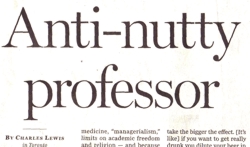 |
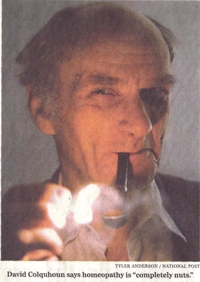 |
 |
The interview was broadcast on Sunday morning (28 Jan) and elicited a lot of correspondence. CBC made it available as a podcast which can be downloaded from CBC here. The endarkenment interview was the last 22 minutes (out of 64 minutes) [play the interview here (mp3, 20 Mb)]. |
Sunday Edition: the follow-upThe week following this CBC show, the backlash started. The Sunday Edition wrote
“A stirred-up hornet’s nest is a mild disturbance compared to the firestorm we unleashed last week over my conversation with Dr. David Colquhoun. Dr. Colquhuon [sic] is a gangly, pipe-puffing British pharmacologist who thinks all alternative medicine, all of it, is a fraud perpetrated by quacks. But he went further, somehow suggesting that those who believe in it probably supported Margaret Thatcher, Ronald Reagan and the Ayatollah Khomeini. He pooh-poohed acupuncture, chiropractic, homeopathy, even vitamins.
Well, his remarks opened the floodgates of listener mail, screaming for Dr. Colquhoun’s head on a pike. In a few moments, alternative or complimentary [sic] medicine strikes back. With the help of two experts, we will try to give the other side of contentious Colquhounism.”
The programme for 3 Feb 2008 started with a few emails from listeners, mainly of the “homeopathy cured my granny” type. Nothing of much significance there. But then Enright interviewed Dugald Seely of the Canadian College of Naturopathic Medicine and Dr. Kien Trinh of the DeGroote School of medicine at McMaster University in Hamilton. You can download the podcast here.
The flat earth problem.
Michael Enright was a good interviewer, but Sunday Edition suffers, like the BBC, from a problem. It is admirable that CBC, like the BBC, should strive to be ‘fair and balanced’, but it is not always easy to see what that means in practice. Is it fair and balanced to give equal time to people who think that the earth is flat and those who think it is spherical (OK, an oblate ellipsoid)? Perhaps, but it also
quite misleading because it can easily convey a very distorted idea of the balance of informed opinion. In this case the flat-earthers are the homeopaths and other alternative medicine advocates. That would not matter so much if the interviewers had enough knowledge of the subject to pin down the falt-earth advocates with the sort of penetrating questions that people like John Humphrys (of the BBC’s Today programme) are so very good at. When it comes to science, though, the flat-earthers tend to get away with murder, and the public can easily be left with a very distorted view. Which “expert” should they believe? If I had been given the option, I would have loved to debate the problems of alternative medicine directly with Trinh and Seely I could have asked then a few questions that Enright missed.
Let’s take a look at what happened at the follow-up.
Quackery at McMaster University
McMaster is one of many universities in North America that has chosen to betray the intellectual tradition of the enlightenment by buying into superstition (see the roll of shame here). The ‘contemporary medical acupuncture program appears to run under the aegis of the anaesthesia
department, though the fact that is doen’t appear on the department’s front page suggests there may be some embarrassment about it. The medical acupuncture program itself, has separate web pages which don’t seem to be on the McMaster server at all (they are on a private server, ThePlanet.com Internet Services, Inc.
As so often, these pages pay lip service to an ‘evidence based’ or ‘scientific’ approach, while doing nothing of the sort. In his CBC interview Kien Trinh agreed (twice) with my contention that trials had shown that it doesn’t matter where you put the needles. But then he failed totally to draw the obvious conclusion that ‘meridians’ are mumbo jumbo. He went right on taking the conventional mystical view of meridians and “energy” flow. Like most proponents of alternative medicine, Trinh seems to live in some sort of parallel universe in which the normal rules of logic don’t apply.
On wouldn’t expect regular anaesthetists to accept this sort of mystical nonsense, but it seems one would be wrong. When I wrote to the Chair of the Department of Anesthesia, at McMaster to ask about their relationship with acupuncturists there was no hint of embarrassement. Dr Norman Buckley, BA (Psych), MD, FRCPC, wrote
“It operates under the principles of evidence based medicine, and relates the concepts raised by the Acupuncture/traditional Chinese medicine to physiology anatomy et as it is more usually taught in Western schools.”
That would be all very well if it were true, but it simply isn’t true. The evidence just isn’t there, and the departments involved make no serious attempts to get evidence. In a later letter, Dr Buckley seems to acknowledge that it may be all placebo, but seems reluctant to offend anyone by saying so. That, I suspect, is how quackery has gained such a foothold.
It is good to keep an open mind, but if it is too open your brains fall out. Or, in another variant, if it is too open, someone will fill it with trash.
One looks in vain on Trinh’s web site for any good evidence. They quote approvingly the conclusion of a 1997 NIH Consensus statement that says “There is sufficient evidence of acupuncture’s value to expand its use into conventional medicine and to encourage further studies of its physiology and clinical value.”, but forget to mention that this document is headed “This statement is more than five years old and is provided solely for historical purposes.”. The department doesn’t seem to do much original research, just to write endless reviews of other peoples’ work. The reviews aren’t too bad, and mostly they come to the right conclusion, that there is not enough evidence to come to firm conclusions. The difference from science is that this doesn’t dent their confidence for a moment. A typical sort of conclusion seems to be
Elbow pain. A review by Green et al. concluded “needle acupuncture [is] of short-term benefit with respect to pain, but this finding [is] based on the results of two small trials, the results of which [are] not able to be combined in metaanalysis.”
The results of thousands of years experience with acupuncture seem to be pretty pathetic so far..
Quackery at the Canadian College of Naturopathic Medicine (CCNM)
Unlike McMaster, CCNM isn’t a proper university, though nonetheless is hands out ‘doctorates’. Dugald Seely’s contribution was interesting insofar as he admitted that there was a lot of fraud and unjustified claims in the alternative medicine industry (never forget there are megabucks involved). What he didn’t explain was how he himself could be distinguished from the frauds. The problem, as always is the second-rate research that goes on in this area.
Take one of Seely’s papers, Adaptogenic Potential of a Polyherbal Natural Health Product: Report
on a Longitudinal Clinical Trial. Is only too typical: a small non-randomised, open-label (not blind) “trial” of a complex herbal mixture on 17 patients. The conclusion was, as it almost always is,
“Further research using a randomized controlled design is necessary to confirm the findings from this pilot study.”
In other words, no conclusion at all. Why is it that the proper trial never seems to appear? Could it be that naturopaths, and the wealthy industry behind them, are afraid to do proper trials? That is certainly the impression they give.
One way in which the alternative medicine industry operates is to invent new words with ill-defined meanings (and Big Pharma does it too). In case you were wondering about the word “adaptogen” it is defined as “Essentially the adaptogen supports the body’s ability to ‘adapt’ ideally to its environment. Essentially the adaptogen supports the body’s ability to ‘adapt’ ideally to its environment. ”
Whatever that means.
The Canadian College of Naturopathic Medicine offers the following “therapies”.
- acupuncture/Asian medicine
- botanical medicine
- physical medicine (massage, hydrotherapy, etc.)
- clinical nutrition
- homeopathic medicine
- lifestyle counseling
Well, nothing wrong with nutrition and lifestyle counseling as long as the claims aren’t exaggerated. But, as always, the claims that are made are vastly exaggerated. For example they claim
Homeopathic remedies are particularly effective for:
- depression
- anxiety
- allergies
- infections
- gynecological concerns
- skin conditions
- digestive problems
- chronic and acute conditions including colds and flu
These claims are simply not true, in my view. If you don’t believe me, check NELCAM (the NHS Complementary and Alternative Medicine Specialist Library). This is written by advocates of alternative medicine, yet it finds no convincing evidence for effectiveness of homeopathy in any of the conditions listed above.
Or, even more remarkably, from a report in Newsweek.
“Dr. Jack Killen, acting deputy director of the National Center for Complementary and Alternative Medicine, says homeopathy “goes beyond current understanding of chemistry and physics.” He adds: “There is, to my knowledge, no condition for which homeopathy has been proven to be an effective treatment.”
The National Center for Complementary and Alternative Medicine (NCCAM) has, incidentally, spent almost one billion US$ billion of US taxpayers’ money and has come up with next-to-nothing useful.
So the claims made by the Canadian College of Naturopathic Medicine are not backed up even by people who are directly involved in alternative medicine You don’t have to be a rocket scientist to understand that the medicine contains no medicine.

